
foreword | Historical Narratives | Resources | Links | Contact
LACKLUSTRE LEADERSHIP vs "RABBLE IN ARMS"
History is like that - very chancy.
In 1775 the 13 Colonies had decided upon independence and prepared themselves for the conflict to come with Mother England. The Second Continental Congress faced an important decision: who was to lead the American army against Britain's military might? The focus fell on George Washington. Despite one member from Washington's own colony of Virginia who declared that while he was a decent chap, Washington was no warrior and had lost every big battle he had ever been in, the Second Continental Congress on the 15th of June, 1775, appointed Washington "General and Commander in Chief of the Army of the United Colonies." Washington formally took command on 3 July 1775 and set out to create a fighting force out of fractious, unruly recruits whom he described as "a mixed multitude of people under very little discipline, order or government."
The Declaration of Independence [*] was issued by Congress in Philadelphia on July 4, 1776.
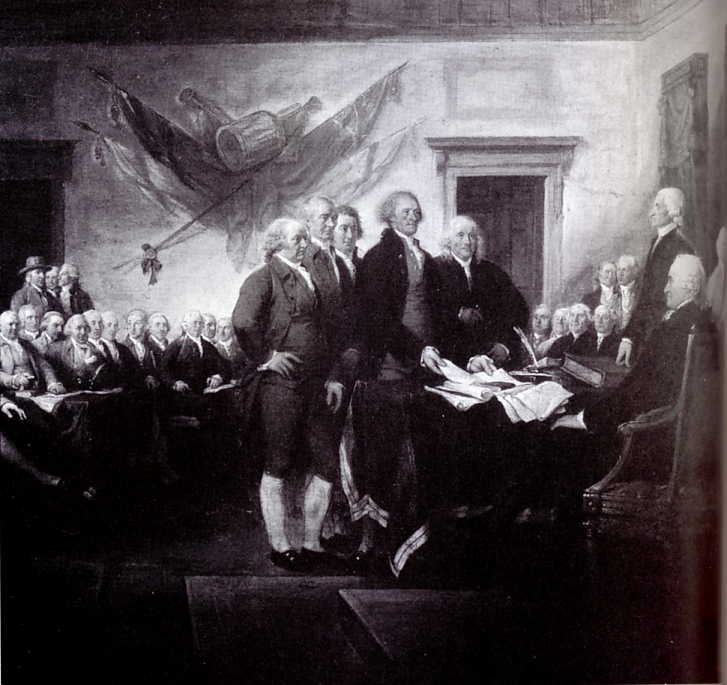 |
|
Declaration of Independence |
On July 12th Admiral Richard's Howe's British fleet arrived at New York to stamp out a revolt. First, however, Lord Howe sought a peaceful solution. He carried the King's commission to restore the Anglo-American relationship to what it had once been. Howe attempted to open negotiations with Washington by sending under a flag of truce a letter addressed simply to 'George Washington, Esq.' Washington refused to accept the letter because it made no reference to Washington's status as a general.
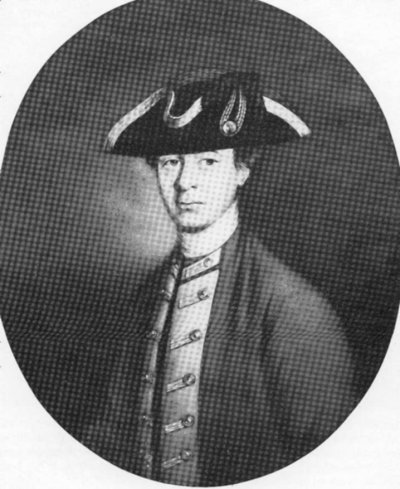 |
|
Admiral Lord Richard Howe |
Incensed by such silliness, Howe declared, "We strove as far as decency and honour could permit to avert bloodshed and yet it seems beneath the head of a banditti of rebels to treat with a representative of the king because it is impossible to give all the titles the poor creature requires." When the British finally yielded and addressed the letter to 'General' Washington, a triumphant Washington asserted that very act represented recognition of the illegal rebel government and its independence.
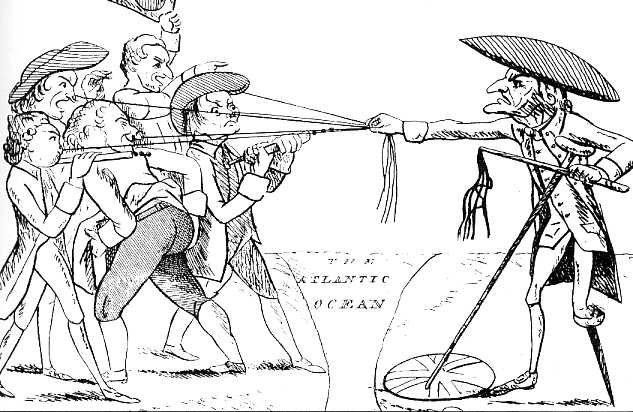 |
|
Angry Old England trying to restrain the rebelling colonists - 1776 |
Meanwhile in England on the crisp, sunny afternoon of Oct. 26, 1776, as George III proceeded on his way to open Parliament, there was very little hissing from the host of onlookers. The king felt secure "in the affection of his people." When he commenced his Speech From The Throne, the magnitude of this moment was not lost on his listeners. In a clear voice that carried well, George III crossed the Rubicon as he launched into a diatribe directed against the revolting Americans.
"Theirs was a desperate conspiracy. All the time they were professing loyalty to the parent state and the strongest protestations of loyalty to me, they were preparing a rebellion." He had like parliament acted in a spirit of moderation and was "anxious to prevent if it had been possible the effusion of blood of my subjects and the calamities which are inseparable from a state of war." The king said he hoped they would see the light and recognize "that to be a subject of Great Britain with all its consequences is to be the freeest member of any civil society in the known world. The rebellious war is manifestly carried on for the purpose of establishing an independent empire. I need not dwell on the fatal effects of such a plan. The object is too important, the spirit of the British nation too high, the resources with which God has blessed her too numerous to give up so many colonies which she has planted with great industry, nursed with great tenderness, encouraged with many commercial advangtages and protected and defended with much expense of blood and treasure."
Since clearly it was the better part of wisdom "to put a speedy end" to such disorders, he was increasing both his naval and land forces. Further he was pleased to inform Parliament he had received "friendly offers of foreign assistance. When the unhappy and deluded multitude against whom this force will be directed shall become sensible of their error, I shall be ready to receive the misled with tenderness and mercy and grant pardons to certain persons upon the spot in America." After his 20-minute speech in which he committed his country to a catastrophic conflict, he returned blithely to St. James's Palace as peaceably as he went.
Members of Parliament filed into the House of Commons and debate began on the King's address. Lord North, the stout, round-shouldered Prime Minister, sat conspicuously silent in his front bench seat, his large, near-sighted eyes and full cheeks giving him the look, as the wit, Horace Walpole, said, of a blind trumpeter. North was a much-liked moderate, an urbane and intelligent individual who had made his career in the Commons with his affable manner that made few enemies.
Even though the outcome was understood, the speeches in support of American patriots made for fine theatre. One member said no one who praised "the glorious spirit of freedom" could fail to be moved by the spectacle of Bunker Hill where "an irregular peasantry" had so bravely faced "the gallant Howe" leading the finest troops in the world. "Who is there that can dismiss all doubts on the justice of a cause which can inspire such conscious rectitude?"
Colonel Isaac Barre, a badly disfigured veteran of the Battle of Quebec in the Seven Years' War, had been hit in the head with a musket ball that blinded him in one eye and left his face twisted into a permanent sneer. In an early speech in defence of Americans, he first used the felicitous phrase, 'Sons of Liberty'. Americans rebels rejoiced in the name and it became their rallying cry. Barr informed his listeners that the one good 'military eye' he had left did not deceive him. The only way, he wisely warned, to avert "this American storm" was to reach an accommodation as soon as possible.
The great British parliamentarian, Edmund Burke, spoke next. He reminded the Members of Parliament that, "Slavery they can have anywhere. It is a weed that grows in any garden. Freedom they can have from none but you."
After Burke's two hour oration, the 26-year old George Fox made what the London Chronicle described as "a masterly, forcible and expressive" speech. Fox was an unabashed fop and dandified 'macaroni' who happily appeared in high-heeled shoes each of a different colour. He eagerly spent the nights drinking and gambling away his father's fortune in London's best clubs. While a dandified dilettante, Fox's intellect was second to none. He was also a brilliant speaker who never used notes and always spoke extemporaneously.
His words on this occasion came back to haunt the hawks. "Lord Chatham, the King of Prussia, nay Alexander the Great, never gained more in one campaign than the noble Lord North has lost - he has lost a whole continent. I cannot consent to the bloody consequences of so silly a contest about so silly an object conducted in the silliest manner that history or observation has ever furnished an instance of and from which we are to derive nothing but poverty, disgrace, defeat and ruin." He stated that to recognize an independent America would not hurt Britain, but would rather win her a powerful friend. Pursuing the war would end any hope of friendship and invite France to enter the confict on America's side. With a speech called "marvelous for method and memory" Fox silenced the government. Tragically, his words of great wisdom went for naught. His motion that no more regiments be sent to America was defeated 259 to 165. The clash the king wanted would continue.
Prime Minister North lamented to the king that he was not the man to master a government in time of crisis. It required, he said,"a man of greater abilities." North took no comfort in the vote for he saw serious consequences ahead and warned with fantastic foresight, "That if America should grow into a separate empire, it must cause a revolution in the political system of the world and if Europe did not support Britain now it would one day find itself ruled by America." ,/p>
Benjamin Franklin was relieved to believe that no nation would rush to support Britain for "every nation in Europe wishes to see Britisn humbled having all in their time been offended by her insolence."
Once war began in earnest there were those in and out of the British parliament who openly supported the success of the colonies. Some resented a war with 'other Englishmen' whose cause they considered to be just. Others saw support for the rebels as a way of limiting the growing power of the king. They opposed the war which the sovereign supported because they objected to George III's persistent efforts to increase the authority of the crown. However, at the very time when parliament should have prevailed and limited the influence of the king, weak-willed politicians abdicated their responsibilities to a sovereign who favoured only force.
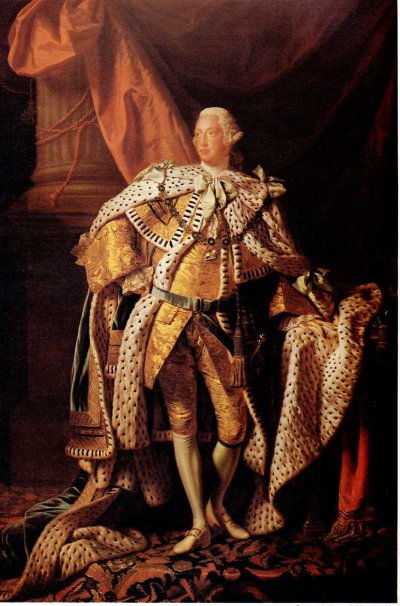 |
|
George III in all his splendor |
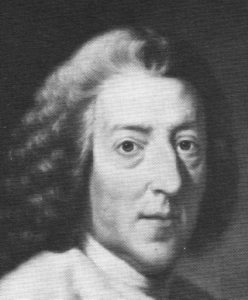 |
|
William Pitt the Elder (Lord Chatham) |
On New Year's Day, Monday January 1, 1776, the first copies of the King's Throne Speech arrived with the ships from London and were sent across the lines from Boston. The reaction of many who read it was rage and indignation. The speech, which was burned in public by the soldiers, had a profound effect on George Washington. If nothing else could "satisfy a tyrant and his diabolical ministry, we are determined to shake off all connections with a state so unjust and unnatural. This would tell them not under covert but in words as clear as the sun in its meridian brightness."
Because the king's power was indefinite, George considered it infinite. Those who opposed the American conflict saw this as a way of restricting the sovereign's power. They believed the American cause would ultimately prevail and openly declared this early in the conflict. One of the most distinguished of these outspoken individuals was the great William Pitt the Elder, Earl of Chatham.
In November 1777 Pitt rose in the House of Lords and appalled the other peers with his declaration.
In His Own Words
"My Lords, you cannot conquer America. You may swell every expense, pile and accumulate every assistance you can buy or borrow, traffic and barter with every little pitiful German prince that sells or sends his subjects to the shambles, but your efforts are forever vain, doubly so from this mercenary aid on which you rely, for it irritates to an incurable resentment in the minds of your enemies." What he asked, are your chances of winning against "three millions in America who prefer poverty with liberty to guilded chains and sordid affluence and who will die in defence of their rights as men, as freemen. The idea is too ridiculous to take up a moment of your lordships' time. If I were an American, as I am an Englishman, while a foreign troop landed in my country I never would lay down my arms, never, never, never. I rejoice that America has resisted."
Pitt urged Britain to show prudence and good temper and the Americans would reciprocate.
Be to her faults a little blind.
Be to her virtures very kind. He moved a resolution to withdraw British soldiers from Boston but while he had the voice he did not have the votes and it was defeated: 18 in favour; 68 opposed.
In 1778 Pitt rose in the House of Lords again to criticize what he thought was the grievous policy of the government. While he never supported the 13 Colonies' fight for independence, he blamed Prime Minister Lord North and King George III for persuing a catastrophic course that drove the Americans from the empire. During his castigation of the government, Pitt collapsed and was carried out of the chamber a dying man. It was one of the most dramatic moments in British politics.
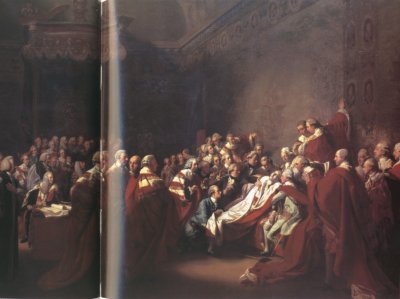 |
|
William Pitt's Collapse in the House of Lords |
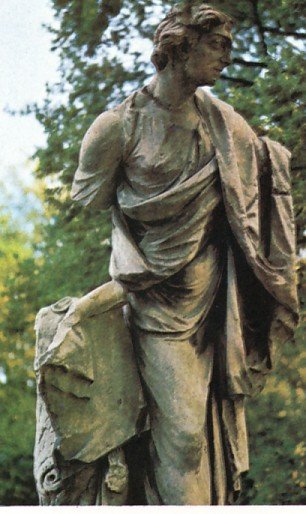 |
|
LA statue of Pitt stands in Charleston, South Carolina |
Four years later in January 1781, William Pitt's son, William Pitt the Younger, roset in the House of Commons and in his second speech to the Members, he too denounced the war with America
In His Own Words
"as most accursed, wicked, barbarous, cruel, unnatural, unjust and diabolical."
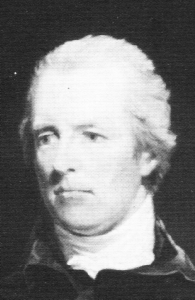 |
|
William Pitt the Younger |
Edmund Burke opposed the war and argued eloquently for understanding and compromise at this critical time. In his three-hour speech on March 22, 1775 he urged his fellow Members of Parliament to remove the Americans' causes of complaint. Britain must govern America, but govern only with consent. The colonists were Englishmen born with a free spirit. An Englishman is the unfittest person on earth to argue another Englishman into slavery"
In His Own Words"Magnanimity in politics is not seldom the truest wisdom; a great Empire and little minds go ill together."
At 11 P.M. the House divided. Burke's motion failed: 78 for; 270 opposed.
Two hundred and one years later at Philadelphia, Pennsylvania on July 6, 1976, on the occasion of the bicentennial of American independence, Queen Elizabeth II recognized the failure of Britain's leaders to listen and learn from Pitt and Burke.
In Her Own Words
"We lost the American colonies because we lacked the statesmanship to know the time and the manner of yielding what it is impossible to keep."
"A government of little minds" and the lacklustre leadership by British politicians accounted for the loss of the colonies, but the principal figure in the fiasco was Queen Elizabeth's predecessor, George III. Thanks a pathetically passive parliament, the sovereign called the shots. The full extent to which the king actively directed the repressive policies on the colonies became clear many decades later when the archives at Windsor Castle were opened. He was one of the hardest working monarchs of English history, writing an endless flow of instructions, letters and comments in his own clear hand. It was he who prodded the government into passing acts that led to war. He kept the war going, refusing all thoughts of conciliation or compromise with the colonies.
Sharing the blame with the inept, stubborn sovereign for Britain's colonial catastrophe were the arrogant and incompetent British commanders in the field - Howe, Gage, Clinton, Cornwallis and Lieutenant General John Burgoyne. It is the fate of generals that their heroics or blunders determine the outcome of wars and the British generals unfailingly ensured their fair share of the latter. Never prepared to listen and learn from the colonials who often knew better, these haughty, high-handed, contemptuous, autocratic individuals ensured by their arrogant imperiousness, bitter colonial enmity and ultimately military defeat.
Examples of their incompetence abound. General Thomas Gage dilly-dallied and gave George Washington time to build an American fighting force. William Howe sacrificed 1,054 brave individuals in a frontal assault to gain useless Bunker's [Breed's] Hill.
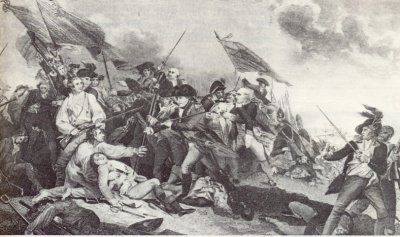 |
|
Butchery on Breed's Hill |
On two other occasions, Howe travelled by long sea voyages when direct overland attacks might have turned the tide. Lieutenant General John Burgoyne paraded his over-burdened army pointlessly through dense wilderness before being forced to surrender his entire force at Saratoga. Gentleman Johnny was a man of many talents, but he has the misfortune to be remembered during the American Revolution chiefly for his surrender at Saratoga which ultimately led to the loss of the colonies. Charles Cornwallis repeatedly let Washington elude him before finally shamefully surrendering to him at Yorktown. Where was Wolfe when they need him!!
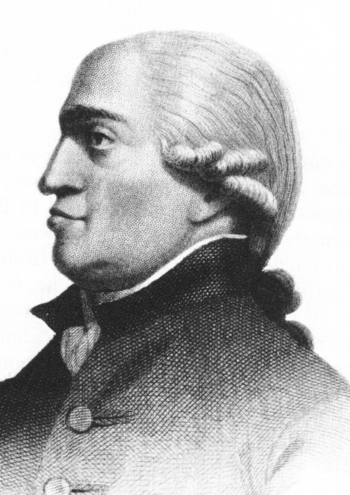 |
|
Lieutenant General John Burgoyne [1722-1792] |
In April 1776 Burgoyne, whose wife was critically ill, responded to the king's request to lead reinforcements to Canada where he was to serve as second in command to Sir Guy Carleton. While Burgoyne dubbed the rebels "rabble in arms" and "a preposterous parade," he was not unsympathetic to their cause. In fact, his sentiments could even be described as friendly. Although he fought the Americans without a twinge of misgiving, his heart was never fully in the fight. In a long laboured letter to his king, Burgoyne confessed this lack of enthusiam for the conflict. Nevertheless, he was rewarded with the rank of lieutenant general and on the 29th of May, he landed at Quebec from where he followed after Carleton whom he met at Lake Champlain some 75 miles south-west of Quebec. It was not long before the two men disagreed on strategy. Carleton feared his lines were too extended to keep open during the coming winter and decided to withdraw into Canada. Burgoyne found Carelton's caution frustrating.
When he learned of his wife's death, Burgoyne complained that his mind was "sunk in distress" and his constitution "unfitted to severity of cold." He sailed without leave for England. While he was in London arranging for his wife's funeral, he met with the king and Lord Germain, who had survived his military disgrace and was Secretary of State for the American Department in Lord North's cabinet. As luck would have it, this made Germain Carleton's immediate superior. Burgoyne presented his plan to the king and Germain. Germain did not like Carleton and enthusiastically supported Burgoyne's appointment to command the army. Carleton, then Governor of Quebec, was relegated to the role of a supporter and spectator.
The hostility that existed between Carleton and Germain resulted during the Seven Years' War at the battle between the British and the French forces at Minden in 1759. Germain, who had a good reputation, was accused of being slow to obey orders. When he withheld permission for the British cavalry to "ride down the French forces" who were in retreat, so that a fellow officer would not to gain glory for the victory, he was court-martialled. Germain was convicted of failure to follow orders. His military career ended when the court declared him unfit for further service. Carleton, who suspected cowardice, felt nothing but contempt for Germain and considered it demeaning to be under the command of a man many referred to as the 'Coward of Minden.' The contempt between the two men was mutual. Germain was the only member of the cabinet to oppose Carleton's creation as a Knight of the Bath.
As a minister Germain earned a high praise and was well regarded by the king whose hard-nosed attitude towards the rebels he shared. Germain had no sympathy for the "riotous rebels," and urged they be struck with "a decisive blow." by Burgoyne.
Few doubts in his ability to prevail ever assailed the genial, gentleman, Johnny Burgoyne. His military treatise entitled with characteristic flamboyance, "Thoughts for Conducting the War from the Side of Canada" was well received in the highest quarters and the implementation of his 'Thoughts' was entrusted to his leadership. Notwithstanding Burgoyne's somewhat amiable attitude towards the Americans, King George was enchanted with the plan he confidently proposed and approved his command of the major offensive. Germaine was ordered to see that Burgoyne's plan was carried out. Germain heartily concurred and instructed Carelton to aid and abet Burgoyne "in meticulous instructions that were insulting in their minuteness."
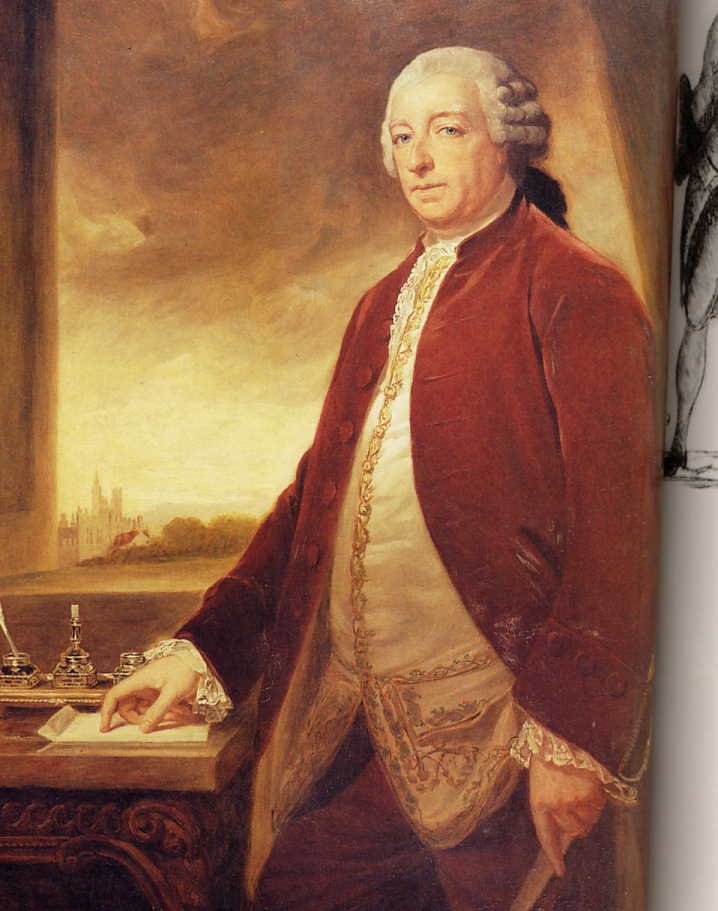 |
|
Lord George Germain |
Carleton was doubly distraught for claimed ownership of the strategy of separating New England from the rest of the colonies which Burgoyne adopted as his own. The plan was to cut off rebellious New England by taking control of the Hudson River, isolating the region and then squeezing it into submission. Carleton, who had expected to be placed in command of the enterprise in 1777, was now replaced as commander of the campaign by his deputy, Gentleman Johnny Burgoyne.
Carleton bitterly informed Germain he would resign, "Since you have taken the conduct of the war entirely out of my hands." Despite King George's coolness towards Carelton for having once disparaged "the alien Hanoverian dynasty" from which George had sprung, the king refused to accept his resignation. Instead he ordered Carleton to provide every assistance necessary to mount, launch and sustain Burgoyne's offensive. Carelton, still burning from being bypassed, courtly complained that he could not spare the troops and he did little to bolster Burgoyne.
Bearing the sovereign's seal of approval, sprightly, handsome, jaunty Johnny Burgoyne arrived at Quebec on 6 May, 1777 aboard the frigate Apollo. His dispatch case was full of plans and his heart brimming with bravado and ambition. His general orders read: "The Army embarks tomorrow to approach the enemy. We are to contend for the King and the Constitution of Great Britain to vindicate the Law and relieve the oppressed, a cause in which his Majesty's troops and those of the Princes, his allies, will feel equal excitement. The services required are critical and conspicuous. During our progress occasions may occur in which neither difficulty nor labour nor life are to be regarded. THIS ARMY MUST NOT RETREAT."
When Burgoyne heard that the British garrison in Boston was being besieged by Americans he declared to his cheering troops, "What! Ten thousand peasants kept five thousand King's troops shut up? Well let us get in and we'll soon find elbow room." Burgoyne's bluster was the subject of deprecating humour at home in England. Swaggering even on paper Burgoyne bragged in letters home about his successes before he had even achieved them. "Have you read of General Burgoyne's boast in which he almost promises to cross America in a hop, step and a jump." They howled at home at his pomp.
Despite his vain, pomposity Burgoyne was popular with his troops because of his rolling laughter, his friendly good-nature, and what was rare among generals in the 18th century, his real concern for the well-being of his men. When Burgoyne reviewed his troops they cheered him as he smiled and raised his hat. Generals are exalted persons and Gentleman Johnny, as he was known fondly to his troops, was the most exalted of all. He treated his troops like human beings. He was a soldier's friend. Burgoyne had courage and "shunned no danger, his presence and conduct animating the troops. At fifty four he had a brilliant military career behind him as a light dragoon officer dashing about the open plains. With unbounded confidence he bet a colleague he would be home from America victorious by Christmas Day, 1777. The government was looking for action and Burgoyne planned to deliver it.
British strategy was to divide and conquer. The plan was to split the rebellious colonies down the natural fault line of the Montreal-New York waterline. Burgoyne proposed a two-fisted attack from Canada into the upper Hudson Valley. This blow from the north down the Hudson River was to be perfectly timed with a punch from Britain's top commander, General Sir William Howe, up the Hudson River from New York City using the British fleet.
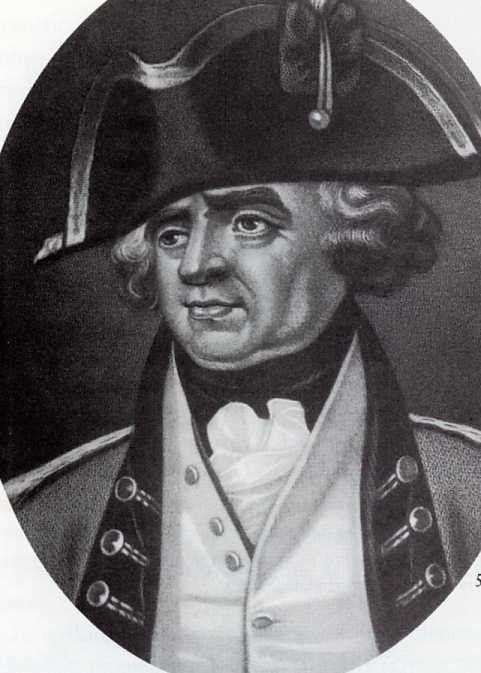 |
|
General Sir William Howe |
Once Burgoyne's troops cut out the American forces waiting at Ticonderoga (called Fort Carillon under the French) and removed the head of the rattlesnake the body would then die. The rebellious colonies would be split in half ending the revolution. Burgoyne's magnificent army - the finest-equipped foreign force ever to invade the United States - had everything in its favour when it began its march: excellent leaders, high morale and a large body of Aboriginal scouts. The enemy presented a confused and ill-organized opposition, "a preposterous parade of military arrangement" lacking both men and supplies. On the 20th of June 1777 the Grand Army of Burgoyne heralded by brass bands and rolling drums left by boats on Lake Champlain and by land on the .
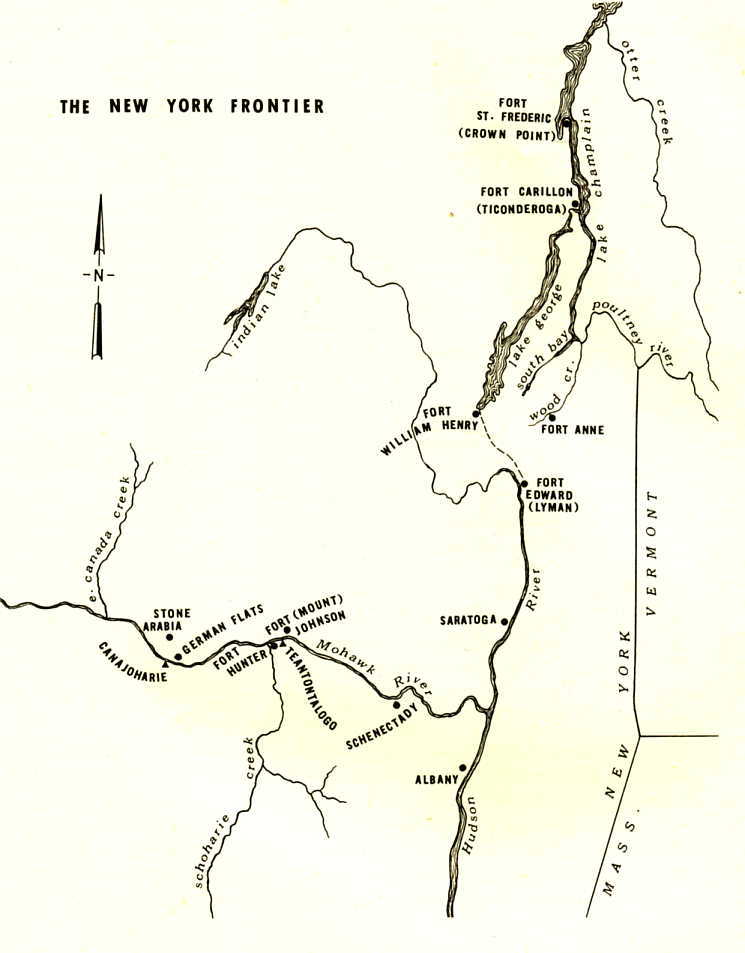 |
|
Lake Champlain Area |
Gentleman Johnny lived and travelled in style. Twenty-six wagons were allocated for the baggage of Burgoyne and his senior staff: tents, camp beds, blankets, cooking stoves, dinner china, silver plate, crystal, wines, champagne, personal supplies and uniforms. At times the army covered as little as a mile a day. Social notes kept on the commander recorded that, "General Burgoyne was very merry and spent many an evening singing and drinking." Burgoyne's luxurious living never tarnished his reputation with the troops. The popular commander possessed a winning manner in his person and appearance."which causes him to be idolized by the army." On every occasion he was "the soldier's friend," knowing so very well that success depended on the spirit of the troops under his command.
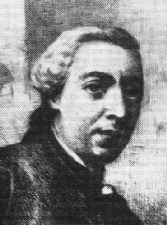 |
|
Gentleman Johnny Burgoyne |
Burgoyne's army comprised some seven thousand troops consisting of four batteries and seven British regiments, their scarlet coats embellished with willow-green, butt and yellow facings. Included also was "the hireling sword," seven German mercenary regiments wearing huge headgear, great leather boots that came up to the thighs and heavy sabres. No troops could have been less well prepared for what these Brunswickers experienced. Travel through the primeval forest took its toll on the men physically and mentally on the men. Beneath heavy helmets and woollen uniforms in horrid, steam-room heat they staggered forward over great trunks of windfall trees and through thick muck and mud, their sabers, haversaciks and musket catching against branches that reached out at them. All the while mosquites circled in whinning clouds and black flies settled on their raw necks and bleeding hands. .
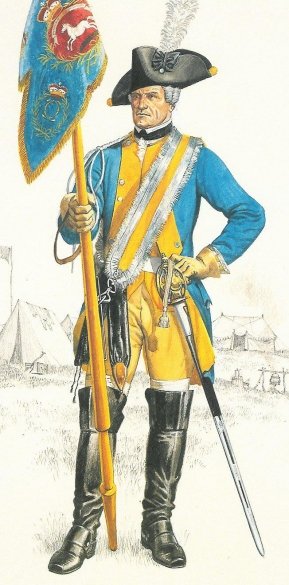 |
|
A German cavalry officer holding a guidon, a cavalry flag. |
Several Loyalist corps wore this red uniform with green facings. Jessup's King's Loyal Americans, formed in 1776 to accompany General Burgoyne's expedition wore red faced with green.
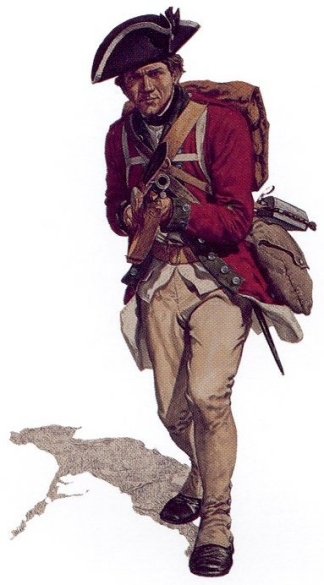 |
|
Burgoyne's Loyalist soldier, 1776-1783 [Gerald A. Embleton. (Parks Canada)] |
Native warriors painted in ochre, crimson, saffron, green and blood-red brought Burgoyne's forces to a total of 8000 officers and men. The long war canoes bore the frightfully painted allies, born warriors who required little in the way of supplies or munitions. Burgoyne cautioned his Aboriginal allies that only military men were to be attacked and all civilians no matter how curt and crusty were not to be harmed.
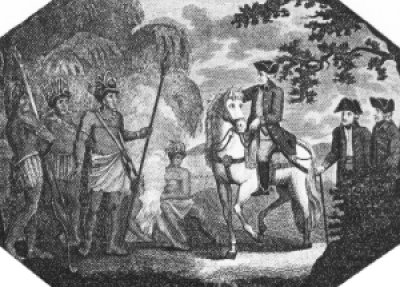 |
|
Burgoyne Addressing Native Warriors |
Burgoyne was a military man who had experienced more than his share of good fortune, A horse had been shot from under him, his waistcoat had been ripped by a rifle ball and he had been forced to remove his hat to rearrange a plume severed by a finely aimed shot. Lady Luck was no where to be seen on this occasion.The invading force was ill-starred from the start, its progress bogged down by carts carrying the voluminous personal supplies ofGeneral Swagger. The London fashion plate so preoccupied with his appearance and creature comforts was unequal to the task he had undertaken. Having himself accurately predicted the problems he would face and the military difficulties of the advance, a wiser man might well have hesitated to incur them."
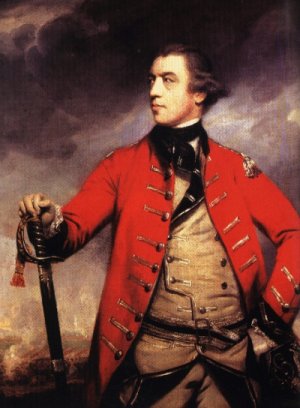 |
|
'General Swagger' Burgoyne |
On July 1st Ticonderoga (an Aboriginal word Cheonderoga meaning clashing waters) came into view. The walls of the stark, grey foreboding fort were softened somewhat by green growth and shaded by the shadows of the forest. The water's edge was guarded by a tangle of undergrowth and a rampart of felled trees with sharpened boughs pointing outwards. The fort was fortified by some 2000 Americans soldiers commanded by Major General Arthur St. Clair, a tall, quiet Scot in his forties with blue-grey eyes and light chestnut hair.
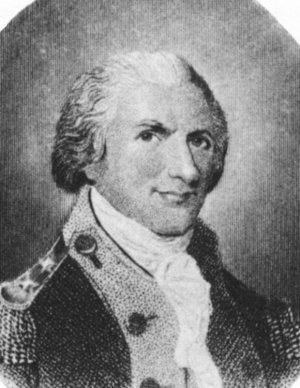 |
|
Arthur St. Clair |
 |
|
'Fort Ticonderoga Restored |
Fort Ticonderoga was dominated by a steep 750-foot, conical craig known by various names - Rattlesnake Hill, Sugerloaf Hill and Mount Defiance. St. Clair was not concerned about the crest because his officers believed it impossible to climb let alone fortify. Its steep forested height was accessible solely, the said, by goats. One of Burgoyne's engineers disagreed. "Where a goat can go a man can go and where a man can go he can drag a gun." He set about to prove his point. An approach was hurriedly hacked out of the forest and two 12-pounders were manhandled up this savage slope to its peak and where a battery was installed to pound Ticconderoga to a pulp. The mile-long distance was demanding even for the biggest cannon. Because of the height, however, they could lob shells at the fort and the psychological effect would be unnerving. With the fort in his sights and Sir William Howe's strong force soon to sweep up the Hudson River, Burgoyne believed good fortune had once again found him.
On the morning of July 5th the rising sun flashed suspiciouly from the top of Sugarloaf. This or a flash of red or some accidental sound from the ultra-secret battery alerted the Americans that someone was on the summit. Arthur St. Clair perceived deadly peril and declared, "We must away from this because our situation has become desperate." Supported unanimously by his officers, St. Clair and his troops abandoned their boast to hold the post to the last and left under cover of darkness. In their haste they left behind cannons, ammunition, a large quantity of stores and their whole stock of live cattle. Ticonderoga's capture without cannons on July 6 brought great joy to the British and blackest despair to the Americans. Burgoyne forces had pulled off a master plan by scaling the steep slope overlooking Fort Ticonderoga.
The important post which was the back gate to the Atlantic colonies was taken without a fight. It opened a corridor for Burgoyne and his invading army and should have permitted them to push south to New York City slicing the rebel army in half and isolating New England, an over-arching objective of British war policy. Burgoyne reported to Prime Minister Lord North that his capture of Ticonderoga had been accomplished "while never menacing and without cannon firing on his part." The rapid withdrawal of the American forces increased Burgoyne's contempt for the oolonists. When word reached England of Burgoyne's triumph at Ticonderoga, George III ran to his wife, Queen Charlotte, shouting,
In His Own Words
"I have beaten all the Americans."
The precipitate evacuation of Ticonderoga, a famous fortress which bulked so large in the imagination of the Americans, had caused astonishment and spread dismay throughout the country. A committee of the Congress was appointed to look into the conduct of the commander at the time of the surrendering of Ticonderoga.
The first round had been won by Burgoyne at Ticonderoga but blunders awaited. Certain of his destiny Burgoyne envisioned a sweeping victory and the highest honours for himself. With this favourable future awaiting him he designed his downfall by plunging into the swampy wilderness south of Lake Champlain. In his military treatise entitled with characterisitic flamboyance, "Thoughts for Conducting the War from Side of Canada," Burgoyne had recommended the water route of Lake Champlain, Lake George, the Hudson River to Albany which would have permitted floating 138 pieces of artillery ranging from the lightest calibres to lumbering 24-pounders far in excess of his needs, as well as stores and baggage in boats while the troops kept to the known route on the left bank. Instead he chose to plunge overland and trundle through twenty wilderness miles where hardly a trail existed through virgin forests even he thought were "impassable."
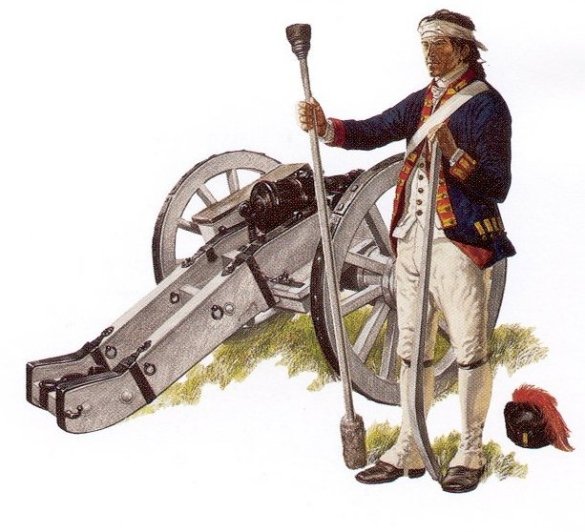 |
|
Burgoyne's Artilleryman |
By inches a road was hacked through hoards of buzzing, biting black flies savaged the exhausted soldiers perspiring profusely in their winter waist coats, tight breeches, high-buttoned gaiters and heavy, long-tailed blue and scarlet uniforms. With backs bent by the sixty pound burdens of musket, bayonet, canteen and cartridges, the Grand Army, many sickened by the bite of malarial mosquitoes, undulated like a giant serpent through the heavy, humid undergrowth, slipping and sliding in the mud as they made their way through land alive with slithering, poisonous snakes.
 |
|
Burgoyne's Route to Ruin |
Burgoyne carried too much of some things and not enough of others. He had too many howitzers, mortars and cannons for a country without roads. The constant necessity of finding fresh horses and forage for this large train of guns, ammunition tumbrels and carts placed a severe strain on his transportation system. He had so little food his forces were on half rations. They found no local sustenance and support for "the liberating army" from any Loyalist sympathizers had been routed by the rebels who then burned the Loyalists' crops and farms and fled. Any Americans who remained were fervently antagonistic, their hostile attitude heightened by their hatred of the Hessian troops.
"The bulk of the countryside is undoubtedly with Congress and is the most active and rebellious race in the continent. It hangs like a gathering cloud upon my left. Wherever the King's forces appeared, American militia numbering three to four thousand assemble within 24 hours. They bring with them their subsistence and as soon as the alarm is over they leave taking the cattle and corn with them." Initially contemptuous of the colonial clods who opposed him, Burgoyne revised his opinion as time wore on. "Each rebel soldier is his own general who will turn every tree and bush into a kind of temporary fortress whence when he hath fired his shot will skip to the next."
Burgoyne faced the problem of supplying his large force from a base 130 kilometres away across the terrible terrain through which he was travelling. Had he chosen to move without his heavy guns and burdensome baggage there was no force between him and Lake Champlain that could have conquered him. He chose, however, to lumber along in pursuit of his fleetfooted foe whose flight finally ended when the Americans had enticed Burgoyne two hundred miles from his base and turned to confront him. Howe was nowhere to be seen.
 |
|
Lord George Germain |
Lord Germain was in charge of overall planning. The question is where was Howe? Lord Germain, an arrogant, hot-tempered, obstinate individual had promised Burgoyne he would write to Howe to acquaint him with his role in the plan. Whether he did or not is open to question. One source says Germain neglected to write the letter. Another says it was sent but it arrived too late. Still another source says that Howe received the message but decided while he was awaiting the rendevous with Burgoyne to attack Philadelphia. Even though Howe held Burgoyne's destiny in his hands, he decided to sail in the opposite direction where he was successful in forcing Washington's retreat. Howe's victory resulted in a flanking party of the 33rd Regiment taking "horse, arms, colours [**] and drums" of the rebel colonel of the Delaware Militia.
Prior to leaving to attack Philadelphia Howe almost casually called to the attention of his second in command, Sir Henry Clinton, whom he had left in command with a small force, that "If you can make any diversion in favour of General Burgoyne's approaching Albany, I need not point out the utility of such a measure." Clinton accepted this as a permissive offhand suggestion and took no immediate action. He later wrote to a fellow officer, "I have not heard from Howe for six weeks and have no orders to co-operate with Burgoyne."
On September 10 a messenger from Clinton managed to slip through the American lines with a letter to Burgoyne. It was coded so it could be understood only if the receiver knew the real message was enclosed within the hour glass shape in the centre of the page as indicated below. Clinton indicated that his forces were weak but he felt he owed it to Burgoyne to attempt to aid him. Clinton's forces unable to force his way far enough up the Hudson to join Burgoyne.
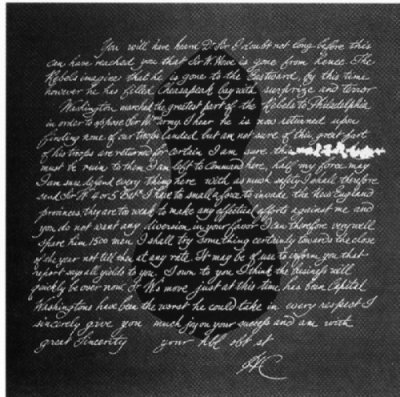 |
|
Coded Letter within the hour glass from Clinton to Burgoyne |
If as some have said, Howe did not receive the letter, Germain was criminally negligent. If Howe had come up the Hudson to unite his powerful army with that of Burgoyne's, success might have been theirs and they might have shared the glory of winning the American Revolution. Of this flagrant failure to ensure prompt and clear communication for this important plan, one historian wrote,"Never was there a finer example of the art of organizing disaster. Howe later boasted of his own "very important and brilliant success" and disparaged word that Burgoyne's situation had been very critical.
As soon as Washington realized that there would be no meeting of Burgoyne and Howe, he seized the chance to strike. "Now let all New England rise and crush Burgoyne." Burgoyne's army clashed with the American force of some 7000 led by Major General Horatio Gates at a place called Saratoga. The battle became an intense seesaw conflict with the advantage veering back and forth between the two forces.
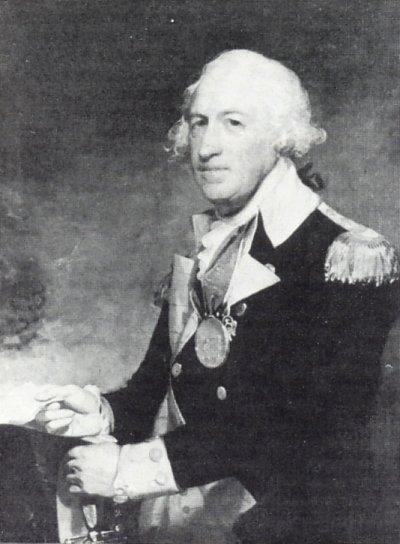 |
|
Major General Horatio Gates |
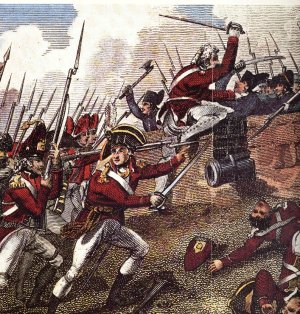 |
|
|
The sabre, pike, bayonet and rifle butt were in full play as men fell under the blows or were cut down in the melee. Burgoyne, looking superb in fresh scarlet and white, rode unhurriedly among his men as bullets ripped his coat and pierced his hat. He only laughed and waved it above his head as the men cheered his bravado. The British assault, while savage resulted in heavy losses, and the survivors were exhausted, hungry and disheartened. The bushes and brambles of the wilderness had reduced their uniforms, the pride of the regulars, to tatters. Their salt pork and flour were running out and their rations were reduced by one-third. When their horses had eaten the meadow grass to the ground there was no more forage to be found and many horses died of starvation. Before Tyconderoga, Burgoyne's impressive force of 8000 rank and file had been reduced to 5000 and this number was rapidly reduced by desertions. The forest made flight easy enough. Every man in camp must have known the invasion had been cancelled and that retreat was hardly possible. The American attackers gave no rest to redcoats who were hungry, disheartened and battle-weary.
Burgoyne's soldiers fired and fought often a tree-hidden targets, the cannoners and gunner officers picked off before a piece could be loaded. There was sustained sniping. Burgoyne described the terrible torment that knew no end."It was the plan of the enemy to harass the army by constant alarms and their superiority of numbers enabled them to attempt it without fatigue to themselves. I do not believe that either officer or soldier slept duing that interval without his clothes or that any general officer or commander of a regiment passed a single night without being upon his legs occasionally at different hours and constantly an hour befor daylight." All that can be said is that Burgoyne and those with him faced the fire gallantly.
Although the actual American commander was General Horatio Gates, it was Benedict Arnold who rallied the troops. When he detected that Burgoyne's centre was weakening, he demanded that 'Granny' Gates, with whom he constantly clashed, provide reinforcements so Arnold could take advantage of the situation. Gates agreed to release a brigade but ordered Arnold of whom he was quite jealous not to return to the fray.
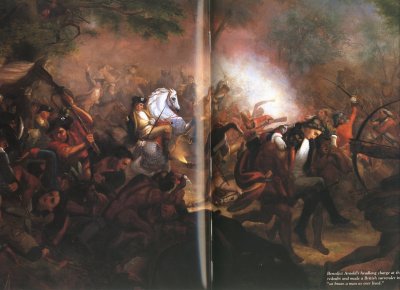 |
|
'Horse Jockey' Benedict Arnold |
Arnold, known as a "horse jockey" because he rode extremely well, disregarded dithering Gates's order and the fiery, fighting comet, whom the men looked to for leadership, spurred his black charger, Warren, headlong onto the battlefield at Saratoga. When he appeared before his regiment.
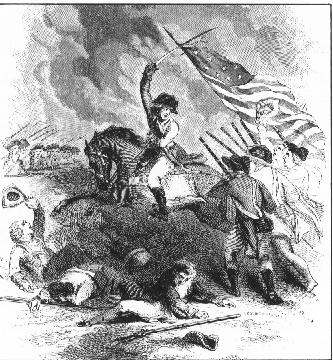 |
|
Benedict Arnold at Saratoga |
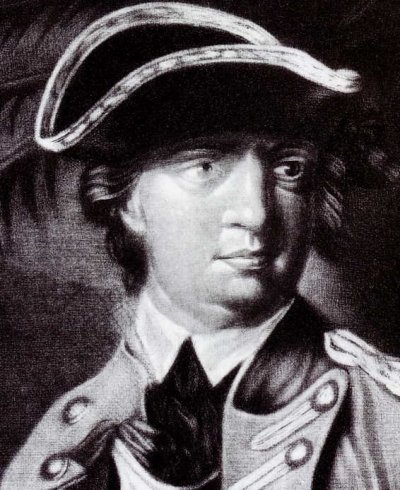 |
|
Benedict Arnold |
cheers filled the air and at the head of his troops he became the real hero of Saratoga. He captured a key redoubt and made a British surrender inevitable. One of his soldiers called him "as brave a man as ever lived." As he was urging his big horse through a sally port he was hit by a bullet in the same leg that had been smashed before the citadel of Quebec in the blizzard on New Year's day, 1776. The wounded leg was to keep him out of action for some time and when he took to the field again it was against his own countrymen.
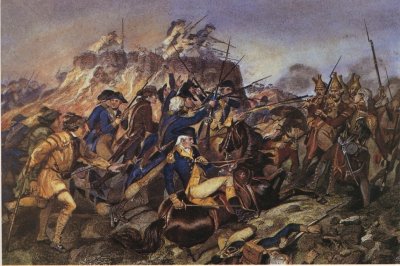 |
|
Benedict Arnold's Leg Was Broken
|
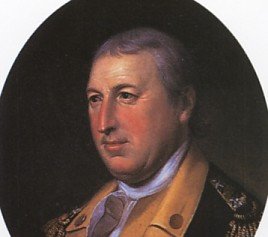 |
|
General Horatio Gates
|
A very jealous Gates did not even mention Arnold's name in his report on the battle.
Later after Arnold had sold secrets to the British and defected to them, Arnold's leg was lauded by Americans; the rest of him suffered as a synonym for a traitor most-foul and ensured his name would live in infamy.
Burgoyne meanwhile faced overwhelming odds while desperately awaiting word from Clinton. He hurled his men against the Americans in a wild, frenzied but futile fight.
"We fought them full six hours like valiant hearts of gold,
Each party scorn'd for to give way, we fought like Britons bold,
Until the leaves with blood were stain'd our General then did cry,
It is diamond, cut diamond, fight on until we die."[***]
Burgoyne's courage was never in question. According to one of his sergeants, he "behaved with great personal bravery, he shunned no danger; his presence and conduct animated the troops; he delivered his orders with precision and coolness and in the heat, fury and danger of the fight maintained the true characteristics of a soldier - serenity, fortitude and intrepidity."
Out-numbered, out-fought and finally out-fortuned, Burgoyne on the morning of the 13th of October called a general council of all his officers. He accepted full blame for their situation and reviewed their options. "Would surrender on advantageous terms be disgraceful?" he asked. The answer was a unanimous "No." Was such a capitulation necessary? To this question all officers pledged their loyalty to "do or die." After hearing out their homage to him, Burgoyne decided to prevent the carnage to come by exhibiting sanity, good judgment and great commonsense. He entered into negotiations with Major General Horatio Gates and asked for "a cessation of arms." There was plenty of bravery and gallantry to go around on both sides.
Early in the morning of the 14th a drummer in a yellow coat marched boldly out, tightened the soggy head of his drum and beat out the parly. Negotiations were long and difficult but astonishingly, Gage agreed to all Burgoyne's terms including his demand that nowhere in the Articles of Agreement should the word 'capitulation' appear, the word 'convention' to be used instead. Loyalists were to be respected and considered British subjects and sent back to Canada. Officers were to retain their small arms and their baggage was not to be searched. A very decisive event in history ended on this curiously courteous note. Gates wrote exaltantly to his wife: "If Old England is not by this lesson taught humility, she is bent on her ruin." Burgoyne showed no humility, admitted to no errors and declared that if all his troops had been British he would have fought his way through.
Ceremonies were set at Saratoga for Friday, Oct. 17, 1777. British and German soldiers formed ranks to ground their arms. This simple ceremony was always a sore point with the 18th century military, so Gates, who was never the most generous nor tactful of men, ordered that no Americans be present to witness the event. First came the British, sullen, silent and by no means convinced they had been conquered. Next came the Germans, who having been sent off to fight someone else's war, accepted defeat with no show of emotion. To crisp clear orders shouted on that fine fall day, the defeated soldiers grounded the tools of their trade, stacked their drums and flags and as prisoners of war, 4693 men languished for a long period of captivity in Cambridge, Massachusetts before a killing march took them down to Virginia and later Pennsylvania where most of them stayed until the end of the war.
Johnny Burgoyne, gleaming in scarlet and white, appeared immaculately dressed in full ceremonial uniform "having bestowed so much care on his whole toilet that he looked more like a man of fashion than a warrior." When the two generals approached to within a sword's length, they reined up and halted. Presenting his sword to Gates Burgoyne raised his plumed hat gracefully and said, "The fortune of war has made me your prisoner."
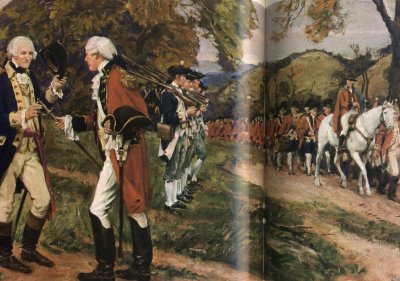 |
|
"The fortune of war has made me your prisoner." (12) |
Gates amicably replied, "I shall always be ready to bear testimony that it has not been through any fault of your excellency."
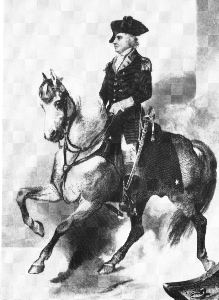 |
|
Major General Horatio Gates |
Gates returned Burgoyne's sword and invited him to a drink of rum and water along with a meal of ham, beef, goose and boiled mutton served on two planks laid across beef barrels, the two laughing all the while at various witticisms. At the end when Burgoyne was asked to propose a toast, he stood and with glass in hand after a moment's pause declared dramatically, 'George Washington'. In return Gates rose and toasted 'King George III'. Gates was generous in his praise of Burgoyne and subsequently wrote to him. "If courage, perseverance and a faithful attachment to your prince could have prevailed, I might have been your prisoner."
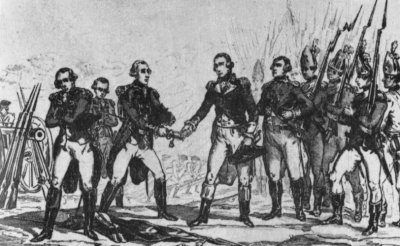 |
|
Burgoyne's Surrender |
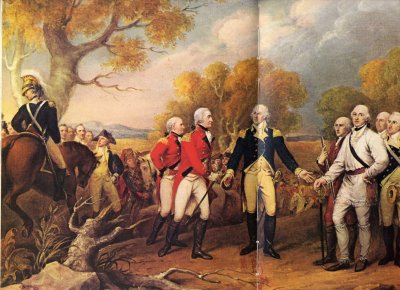 |
|
Burgoyne's Surrender |
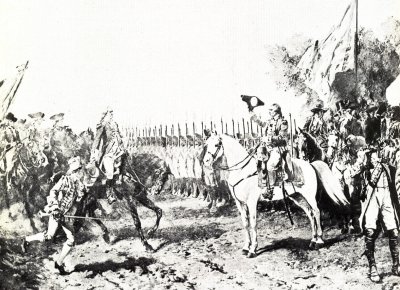 |
|
Burgoyne's Surrender |
"Then soon we overtook them, it was near Saratogue,
Which they had burnt as they had done all houses on their road,
The sixteenth of October was forc'd to capitulate,
Burgoyne and all his army there were our prisoners made."
In America Burgoyne's surrender spread throughout the country leaving in its wake bells ringing, cannon booming, joyous salutes and a growing number of gloomy Loyalists. Across the ocean everyone waited in breathless anticipation to learn the result of Burgoyne's brilliant victory. When news of his catastrophic surrender on Oct. 18, 1777 reached England on December 11, 1777, the government "were in a state of great distraction." The defeat radiated shock waves in London and in Paris and resulted in the British thinking of getting out of the war and the French thinking of getting in. King George in order "to disguise his concern affected to laugh," and this bizarre behaviour was considered by those present to be so offensive the prime minister attempted to stop him.
Lord Chatham's earlier warnings about the futility of the American war had come true. On learning of Burgoyne's defeat Chatham staggered into the House of Lords and lashed the government for bringing "ruin to our door." He thundered warnings about the French preparations for war and recommended to the King "an immediate cessation of hostilities and the commencement of a treaty to restore peace and liberty in America."
Meanwhile in the House of Commons members reacted with shock and sadness at Burgoyne's defeat.
The great parliamentarian Edmund Burke was appalled.
In His Own Words
"A whole army compelled to lay down their arms and receive the laws from their enemies is a matter so new that I doubt if another such instance can be found in the annals of our history."
Lord Germain acknowledged the "melancholy event though the recital must give me pain." "Dreadful news indeed," said the great historian Edward Gibbon who had been elected in 1774 as a supporter of Lord North. The Commons called for an investigation into how Burgoyne's campaign had collapsed. To the Ministry's embarrassment Burgoyne himself on formal parole from his prisoner-of-war status by act of Congress arrived in England to take part as a Member of Parliament in the what he expected would be caustic debates about his "warm skirmishes." The king refused to see him.
On May 26, 1778 Burgoyne appeared dramatically in the House of Commons to defend himself. Germain contested the legality of Burgoyne being examined but Burgoyne argued that the American Congress (although unrecognized by the British Parliament) had permitted his parole to enable him to clear his character. He never had to for the motion for a committee of inquiry into Burgoyne's conduct which Burgoyne himself seconded was rejected by a vote of 144 to 96. To anyone who would listen Burgoyne attempted to defend his defeat. He said had he not been ordered to meet with Howe he would have returned to Fort Edward where he would have been secure "until some event happened to assist him." He felt bound to plod onward to "force a junction with Sir William Howe."
On April 3, 1779 Congress directed Washington to recall Burgoyne and other senior British officers on parole. Burgoyne appealled to his friends for help and Edmund Burke wrote to Ben Franklin seeking Burgoyne's release. Franklin replied that Congress was willing to exchange Burgoyne for Henry Laurens who was then jailed in the Tower of London. Laurens, who was ultimately exchanged for Cornwallis who had also been placed on parole, subsequently joined Benjamin Franklin and others to negotiate a peace treaty with Britain.
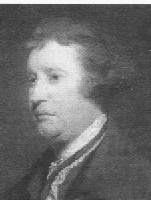 |
|
Edmund Burke |
The Saratoga surrender changed the whole course of the war. Framce was burning to avenge their defeat at the hands of the hated English and when the American victory at Saratoga appeared to indicate that the colonies might just be able to prevail over Britain, French leaders decided to form an alliance with the revolutionaries. The French dreamed of recapturing Quebec and decided to do all in their power to make the break between Britain and her colonies irreversible. The American's solemn Declaration of Independence appealed to divine providence for support, but should providence prove less than forthcoming, Silas Deane, a determined member of the American congress had a backup plan. "We look to heaven and France for succour."
Power on the battlefield resulted in power at the bargaining table. Following the American victory at Saratoga Benjamin Franklin informed the French foreign minister, "We have the honour to acquaint your Excellency with advice of the total reduction of the force under General Burgoyne." After a full year of refusing American requests for an alliance, Louis XVI two days after receiving Franklin's letter invited the Americans on gilt-edged paper to re-submit their request for a formal alliance. France had been waiting ardently in the wings where she had been brooding since 1763. She had emerged from that French-Indian war mired in debt and shorn of virtually all her American territories. Worst of all she felt publicly and indecently disgraced, displaced as the pre-eminent European power despite a population three times greater than England's. Having signed that peace the French sat back to plot their revenge and they hoped it would come in conjunction with America fight for independence. "I hope," said King Louis XVI to Benjamin Franklin, "this will be for the good of both nations." Artful old Ben very nobly thanked the king assuring him, "Your Majesty may count on the gratitude of Congress and its faithful observance of the pledges it now takes." All France got for her American alliance was an empty treasury.
By 1780 Britain was virtually at war with the world. France, Holland and Spain were committed enemies and Russia, Prussia, Denmark and Sweden were leagued against Britain in "armed neutrality." The defeat Lord Chatham had predicted came four years later at a place named Yorktown to a general named Cornwallis.
Lord Charles Cornwallis was born to wealth and position. He was schooled at Eaton and took a military career. Tall and somewhat overweight as was the fashion of the time, he carried himself well and was considered handsome except for a cast in one eye due to a childhood accident. "I love that army," he once declared and their devotion to him was notable. He was the most popular British general serving in America. Known to be strict but fair, he was genuinely concerned with the welfare of his troops.
Cornwallis's army, which was still undefeated, was fortifying a post at Yorktown on the shore of Chesapeake Bay. As long as the British navy was master of the seas and could supply his needs Cornwallis was able to defy his enemies. However, the French fleet under the Count de Grasse, a giant of a man who referred to six-foot three Washington as Mon Petit general, met and defeated the British fleet driving it back to New York. As a result the French now controlled the Chesapeake and immediately implemented a sea blockade of Yorktown while Washington's army barricaded Yorktown by land.
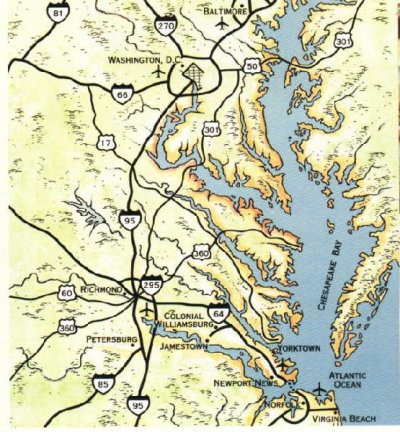 |
|
Yorktown |
It was not long before Cornwallis, whose forces were without food and being battered unmercifully by fifty-two French cannons, was forced to report, "We cannot hope to make a very long resistance."
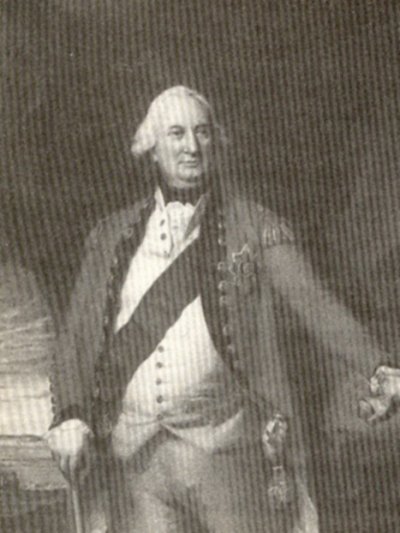 |
|
Lord Charles Cornwallis |
In a letter to Cornwallis, General Washington declared that he wanted to stop "the useless effusion of blood." After only two weeks of feeble resistance, Cornwallis realized there was no hope for his army. As the sick and wounded multiplied by the hour, Corwallis asked his officers should they "Fight to the last man?" They said the men had done all that could be expected of them. "Surrender!" Cornwallis nodded assent. Deciding "It would be wanton and inhuman to sacrifice the lives of this small body of gallant soldiers," Cornwallis ordered a drummer - accompanied by an officer with a flag of truce - to mount the parapet and beat to "parley."
An American officer ran forward to meet the Englishman, following which an aide ran red-faced with excitement to Washington with a sealed letter. Washington broke the seal and read it in stunned silence. "I propose a cessation of hostilities fro twenty-four hours and that two officers may be appointed by each side to meet at Mr. Moore's house to settle terms for the surrender of the posts of York and Gloucester." I have the honour to be Sir, Your most obedient and most humble Servant. Cornwallis." On October 17, 1781 four years exactly after Burgoyne's surrender at Saratoga Cornwallis sent the following letter to Washington.
"Sir,I have this moment been honoured with your Excellency's letter dated this day.The time limited for sending my answer will not admit of entering into the detail of Articles, but the basis of my proposals will be that the Garrisons of York and Gloucester shall be prisoners of War with the customary honours and for the convenience of the individuals which I have the honour to command that the British shall be sent to Britain and the Germans to Germany under engagement not to serve against France, America or their Allies until released or regularly exchanged. That all Arms and publick stores shall be delivered up to you, but that the usual indulgence of side arms to Officers and of retaining private property shall be granted to Officers & Soldiers and that the interests of several individuals in Civil Capacities & connected with us shall be attended to. If Your Excellency thinks that a continuance of the suspension of hostilities will be necessary to transmit your answer, I shall have no objection to the hour that you propose. I have the honor to be your most obedient & most humble servant." (signed) Cornwallis
There was much shuttling back and forth between the lines as parleys took place and eager young aides dashed about with messages. On the 19th men in the French and American lines knew that Washington and others had met with their British counterparts and that a document had been signed. "Done in the trenches before Yorktown in Virginia, October 19, 1781." The first signature on it was G. Washington. At noon that day the still, fall air of Virginia stirred to the beat of drums and the blare of the French cavalry. Men women and children cried out in delight as history unfolded before their eyes when the fields began to flow with regiments marching to the thrilling sound of drums, bugles and bands.
 |
|
Surrender Ceremonies |
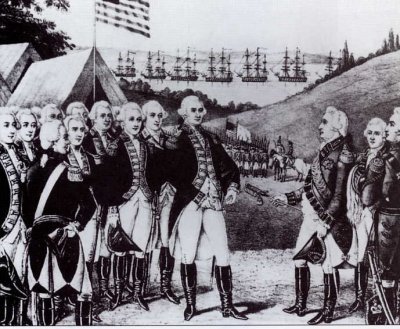 |
|
Yorktown Surrender |
John Graves Simcoe, whose Queen's Rangers were among those surrendering, asked Cornwallis to permit his largely Loyalist Rangers to quietly depart before the capitulation because Simcoe knew they would be treated as traitors and dealt with harshly by the American patriots. When Loyalist militiamen were captured by the American military they were treated as traitors and subject to imprisonment or even execution. Britain on the other hand insisted on treating all patriot prisoners as prisoners of war and as such American militiamen were entitled to the same courtesies of exchange and parole as regular soldiers. A callous Cornwall refused Simcoe's request declaring that all British soldiers would be treated equally. That was exactly Simcoe's argument: they would not be treated equally. Loyalists militiamen stood by in a rage while they saw men who had earlier robbed and ravaged their homes paroled to freedom. One Loyalist writer commented, "In this war only those who are loyal are treated as rebels."
Simcoe had to keep tight rein on his emotions whenever he described the surrender at Yorktown. His intrepid Queen's Rangers were included in that surrender although they were not surrounded as was the main British force. The Queen's Rangers was an elite outfit which under Simcoe's command exercised a series of gallant, skilful, and successful enterprises against the enemy. They killed or captured twice their number without a single reverse. Yorktown was the intrepid little unit's first defeat.
At 10 a.m. on the 17th of October the guns fell silent, the only sound the British drummer boy beating a 'parley'. An American officer recorded, "I thought I never heard a drum equal to it. It was the most delightful music to us all." Talks were opened and two days later at noon on October 19th 1781 agreement was reached. The event was recorded in the diary of an American soldier. "Had the pleasure of seeing a British drummer mount the parapet and beat a parley and immediately an officer holding a white handkerchief made his appearance outside their works. The drummer accompanied him beating all the while. Our batteries ceased firing and an officer from our lines ran and met the other and tied a handkerchief over his eyes. The British drummer was then sent back and the officer conducted to a house in the rear of our lines."
On October 20th Cornwallis capitulated to what the British had called "an inferior force." When Corwallis learned that Washington would be taking his surrender, a mortified Cornwallis exhibited shameful military protocol by opting out of Britain's abject surrender to what he had earlier described as "an inferior foe." Claiming he was too ill to attend the ceremony, Cornwallis dispatched Brigadier-General Charles O'Hara to carry out the distasteful duty.
With a roll of drums the British appeared, their colour guard carrying furled flags and their bands playing The World Turned Upside Down, an melancholy, unmilitary but most appropriate tune. They were led by O'Hara stiffly erect in his saddle, an extravagant-looking figure in enormous jack boots with double rows of curls hanging about his temples. As Washington watched from his great bay horse, O'Hara tried to surrender his sword to Washington who anticipated what he was about to do and said, "Never from such a good hand." O'Hara then gave it to General Benjamin Lincoln who had been delegated by Washington to receive it. The Americans and their French allies formed two lines. The French soldiers resplendent in white broadcloth uniforms "displayed a martial and noble appearance. The Americans, few of whom were dressed in uniforms, stood proudly erect beaming with satisfaction." Between their lines broken-hearted British soldiers wearing for the occasion newly issued red coats marched dejectedly.
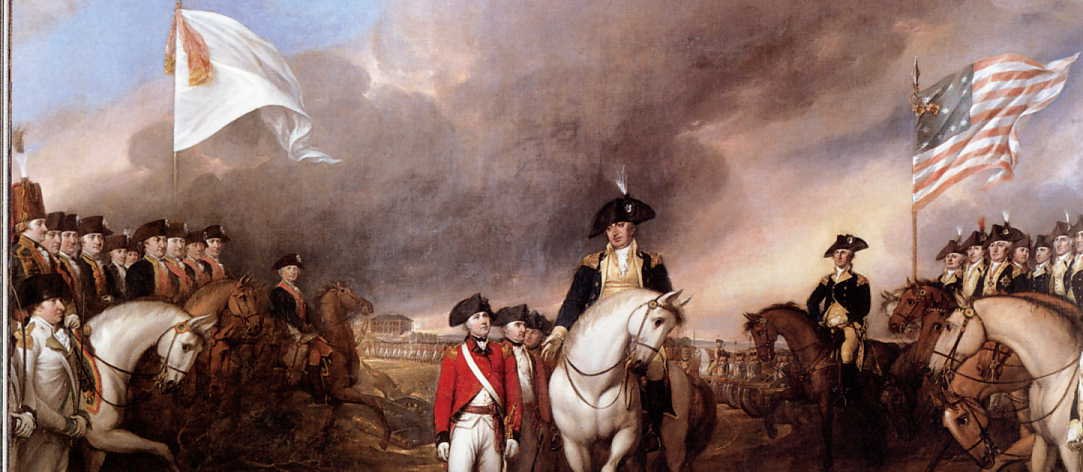 |
|
The Surrender of Cornwallis |
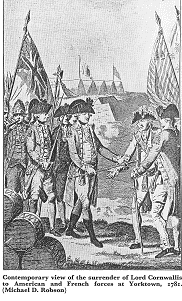 |
|
Cornwallis's Surrender |
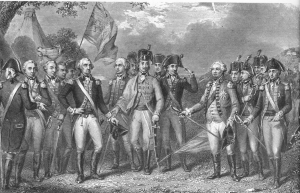 |
|
Cornwallis's Surrender |
In a nearby field a squadron of French hussars formed a circle within which the scarlet-coated British and German Hessians brilliant in blue and green piled their arms. The Hessians stacked their guns neatly. The British, some of whom were weeping, moved along slowly flinging their arms angrily to the ground in a disorderly crash. All the while the several British bands brought the American Revolution to a close. The tune they played was doubly appropriate because it was first performed on a London stage in one of John Burgoyne's comic operas.
The World Turned Upside Down.
"If ponies rode men and flowers found the bees;
And grass ate cows and cats were chased by mice,
And if summer followed spring 'stead of the other way around;
All the world would be upside down."
An American fife and drum band played Yankee Doodle Dandee, the song that had been transformed from a British taunt to a rousing rebel anthem. Washington found no ringing words to celebrate his emotions on this momentous occasion and uttered only a few clichés about "a glorious event" and "an important success." Some 7241 British and German soldiers guarded by the militia were marched off to prison camps in Virginia and Maryland. Cornwallis and his principal officers were promptly paroled and allowed to leave for New York. Prior to departing they dined for several days at the tables of Washington, Rochambeau and other American and French officers.
News of the surrender was quickly dispatched throughout the country by the fastest horsemen. Before long night watchmen walking the streets cried out the time and the news. "Past three o'clock and Cornwallis is taken." The victory was hailed with rowdy rejoicing and exuberant celebrations swept the colonies. Incredulous Loyalists, who found it hard to believe, wondered and worried about the future that faced them. An immediate concern was the preservation of their property through the night from the raging, uproarious rebels. The Loyalists accomplished this by illuminating their windows to give the impression that they too were celebrating the American victory. Mobs roamed the streets looking for unlighted Loyalists' lodgings which they promptly ransacked and robbed. One Loyalist recorded his relief. "We were fortunate not to see the furniture cut up and goods stolen nor been beat nor pistols pointed at our breasts."
Jubilant American citizens were permitted three hours in which to "illuminate on the Glorious Occasion."The following handbill authorizing the people to celebrate by lighting bonfires was issued at General Washington's order.
Illumination
Colonel Tilghman, Aide de Camp to his Excellency General Washington, having brought official accounts of the SURRENDER of Lord Cornwallis and the Garrisons of York and Gloucester, those Citizens who choose to ILLUMINATE on the GLORIOUS OCCASION will do it this evening at Six and extinguish their lights at Nine o'clock. Decorum and harmony are earnestly recommended to every Citizen and a general discountenance to the least appearance of riot. (October 24, 1781)
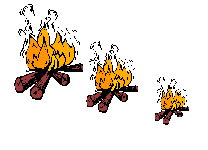 |
|
Illumination |
Although substantial British and Hessian forces still remained in the field, Cornwallis's capitulation was decisive. The defeat broke the resolve of the British to continue the war and convinced them that the effort to overcome the Americans was too difficult and too expensive to continue. In a huge country with a populace committed to their cause, the expense of supporting a great army 3000 miles away was becoming an intolerable financial burden on an already debt-ridden treasury.
When news of the capitulation of Cornwallis reached England it hit Prime Minister Lord North "like a ball in the breast." The distraught politician paced about his room exclaiming in tormented tones,"O Lord! It is all over!" King George was also stunned by the news but vowed to carry on the war "though the mode of it may require alteration."
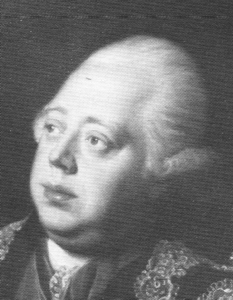 |
|
Lord North |
Throughout England public meetings demanded peace and Parliament reflected this desire. Lord North wrote to George III informing him that both royal policy toward America and his attempt to establish the supremacy of the king over Parliament must cease. "Your Majesty is well apprized that in this country the Prince on the throne cannot with prudence oppose the deliberate resolution of the House of Commons. Parliament has uttered their sentiments and their sentiments whether just or erroneous must ultimately prevail. Your Majesty can lose no honour if you yield."
Yield he did. Five and a half months after Yorktown on March 4, 1782, Parliament started procedures to recognize the victory of "the revolting colonies." The debacle later forced Lord North to resign. In March, 1782 Parliament authorized a subdued sovereign to seek peace with the colonies. The House of Commons declared "it would consider as enemies of his Majesty and the Country all those who should advise or attempt the further prosecution of offensive war on the Continent of North America for the purpose of reducing the revolted Colonies to obedience by force." England asked for terms.
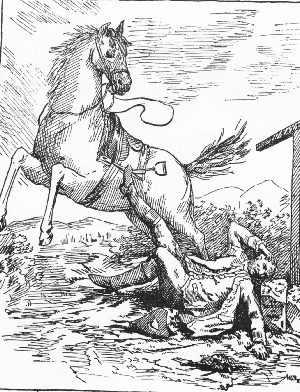 |
|
Cartoon depicting the 13 Colonies dumping Great Britain |
Even before the muskets were muzzled and Cornwallis had capitulated the American Congress had appointed the members of its five-man negotiating committee and instructed them to proceed to Paris and prepare to negotiate peace terms with Great Britain. The new nation to be named the United States of America entrusted its fate to five men: John Adams, John Jay, Benjamin Franklin, Henry Laurens and Thomas Jefferson. The directions given by Congress to this committee in June, 1781 were broad but not deep. They were to demand independence and sovereignty. As far as anything else was concerned, they were told to trust to their own wit, wisdom and sound judgment. They were given only one specific direction: "To undertake nothing in the negotiations for peace or truce without the French knowledge and concurrence." This deference to a foreign power was in recognition of the critical part France had played in America's victory over Great Britain.
American profession of love for France during its struggle with Britain was described by some as "a farce of friendship and union." On hearing of their military alliance Layfayette was said to have thrown his arms around Washington - a man no American dared slap on the back - and planted kisses on both his cheeks. From this first embrace the treaty was an awkward affair. The Loyalist press had a field day with it.
The harmony was short-lived. John Adams and John Jay objected to being shackled to France. On the other hand Ben Franklin was pleased and felt French involvement "well and judiciously placed." Despite his warm words regarding "the generous and noble manner in which the French supported America," Nevertheless, Franklin lost no opportunity to negotiate behind their backs.
The first three-named American negotiators were already in Europe awaiting commencement of the peace negotiations which began on 5th October, 1782. John Adams, who had assisted Thomas Jefferson in drawing up the Declaration of Independence and later became the second President of the United States, compared Britain and the United States to a cat and an eagle. He believed it was always difficult to fathom human nature but thought faces carried clues to character. In the face of Louis XVI, who was decapitated during the French Revolution, Adams saw "goodness and innocence."
Adams knew little French and found the language unintelligible. He was rankled by this portrait of him written in a London paper. "They make fine work of me - fanatic, bigot, perfect cipher, not one word of the language, awkward figure, uncouth dress, no address, no character, cunning hard-headed attorney." Adams neglected to note that the derision issued from the Loyalist press was far more scathing of Dr. Franklin.
John Jay arrived in Paris on June 23rd. He was the chief author of the first constitution of the State of New York and subsequently became first chief justice of the Supreme Court of the United States. Born of wealth and position in New York city, Jay was tall, slim, pale and sharp-featured. The 37 year old, whose hawk-like nose made him appear somewhat haughty, was resolute and dignified.
Benjamin Franklin was an original thinker and a very resourceful diplomat. He was a man of international fame and a member of every important learned society in Europe. It was said that there was "scarcely a scratch of his pen that is not worth preserving." He had his detractors one of whom was John Keats, the great poet, who said Franklin was "full of mean and thrifty maxims and not sublime." Thomas Carlyle, another great Englishman, called him "the father of all Yankees." Others labelled him a cunning schemer with a smooth manner and shifting tactics who "invited suspicions far beyond his actual intent to trick."
It is understandable that Englishmen found Franklin an ojectional individual, but quite surprising that many Americans and at least one of his closest colleagues did too. Franklin was beset by enemies at home. Angry cries wondered why Congress had entrusted "that old, corrupt serpent" with the negotiations on which the nation's existence depended when they had "the fullest evidence and conviction that Dr. Franklin was both a dishonest and incapable man." John Adams, Franklin's erratic and irascible colleague, said in 1782, "As far as cruel fate shall compel me to act with him in public affairs, I shall treat him with decency and perfect impartiality. Further than that I can feel for him no other sentiments than contempt and abhorrence."
Adams found Franklin vain, ambitious and scheming. He said, Benny, Franklin's grandson, had inherited from his grandfather "a dirty, envious, jealous, and revengeful spite against him for no other reason than because I was too honest a man to favour or connive at his jealous schemes of ambition and avarice." Adams maligned Franklin after successfully signing the Treaty of Paris, accusing him of obstructing America's claims to the fisheries and western territories and deploring his "low cunning and mean craft," insisting that Franklin was "secretly conniving" to negotiate all America's trade agreements on his own. Adam's wife, Abigail, shared her husbands hatred of Franklin. No honest man, she said, was safe from the unprincipled Franklin, his "sly secret malice" more dangerous than the open attacks of the English. She ranked him alongside Benedict Arnold.
Adam's picture of Franklin was perfectly consistent with the infidel philosopher often pictured in the Loyalist press who was all the more dangerous for his talent, his urbanity, his ecumenicalism, his scientific prowess. Franklin was seen as an immoderate wizard gloating with ambition and orchestrating a revolution for his own ends. It was said that having overpowered the heavens, he was poised to continue his heist on earth.
Franklin was less a Founding Father than a founding grandfather since he was 40 years older than most of the delegates at the 1787 assembly and made little contribution to the convention. By 1788 Franklin was reduced to petitioning his government for some recognition of his services, an indignity no other Founding Father suffered. He wanted his grandson, Temple, to be given some sinecure, but he never was. Franklin and his son William never reconciled and suffered the same sad fate. William, Temple's father, died in obscurity in London in 1813. Temple died in Paris in 1823 and a kind friend covered his burial costs.
Franklin was frequently at odds with Adams of whom he said
In His Own Words
"Adams means well for his country, is always an honest man and often a wise one, but sometimes he is absolutely out of his mind."
The other two American representatives were: Henry Laurens, the former president of the Continental Congress and a man of some ability who was crossing the Atlantic Ocean when his ship was seized by a British man-of-war. Laurens was confined to the Tower of London on a charge of treason and denied access to anyone. He was even refused use of writing materials. He later declared that his treatment amounted to slow murder. Laurens was released from the Tower of London on payment of bail in the amount of fifty thousand pounds. The money was paid on his behalf by an old friend, Richard Oswald - the same individual who became the main member of Britain's negotiating team. Laurens was eventually exchanged for the British general Lord Cornwallis who was being held in the United States.
In addition to Oswald the British delegation included 27-year old Thomas Grenville, son of the same George Grenville who imposed the Stamp Act on the American colonies. Because Oswald and Grenville vied with each other for Franklin's favour, they put Franklin in the happy position of "having a choice between two hungry suitors."
Thomas Jefferson was in Virginia and refused to attempt the trip across the Atlantic without a guarantee of safe passage from the British government. When this was not forthcoming, Jefferson declined to sail and never sat on the peace commission.
Wise and witty Franklin came to the table prepared with his 'wish' list. It contained eight terms, four of which he classified as "essential." These were:
(1) complete independence;
(2) settled boundaries for the colonies;
(3) shifting the Canadian border north to its position before the Quebec Act of 1774. This act had extended Canada's southern boundary down to the borders of New England, New York, Pennsylvania and Ohio and west to the Mississippi;
4) freedom for Americans to fish off the coast of Newfoundland.
Franklin labelled his second set of four conditions "advisable," by which he meant it would be nice to have them if at all possible. These were:
(1) payment by Britain of reparations for burning down American towns;
(2) Parliament's candid confession of its error in starting the war;
(3) extension of trading privileges to each other;
(4) England's cession to America of Canada and Nova Scotia where Franklin owned property.
Franklin argued that Britain's defeat justified not only acknowledging the existence of the United States of America but also ceding to the victorious Americans the Province of Canada.
In 1776 at the age of 70, Benjamin Franklin had embarked on a brutal trip to Canada. He was sent by Congress to invite Canada to become the 14 state of the union. Ben's son, Franklin, who remained loyal to Britain and became a hated Loyalist in his father's eyes, informed his superiors in London about his father's mission. In his words, "Dr. Franklin planned to prevail on the Canadians to enter into the Confederacy with the other colonies."
The message that Ben brought from Congress to the Canadians closed with a formal invitation to them to elect deputies for their towns and districts who would then meet and elect delegates to attend the Continental Congress to be held in Philadelphia on May 10th. The appeal ended with a prayer. "May Almighty God incline your minds to approve our equitable and necessary measures to add yourselves to us, to put your fate not on the small influence of your single province but on the consolidated powers of North America."
This call from Congress fell on deaf ears. Canadians showed no interest in joining "your sincere and affectionate friends and fellow subjects." Failing to win Canada with words, Congress tried war and sought to seize Canada by force. The British defenders and the American invaders expected support from the Canadian habitants, but both were disappointed. Despite fervent appeals to the habitants from the seigneurs and the priests to fight for the British, they failed to respond. The best that could be accomplished was persuading the habitants not to fight against the British. The habitants hunkered down, remained neutral and waited for the war to pass.
Richard Montgomery, a tall, handsome, dashing Irish officer with a passion for quick action, had served in the British army from 1756 until 1772. When he left the service he married into a wealthy family and settled near New York City. At the outbreak of the revolution, he was appointed a brigadier general in the Continental Army and along with Benedict Arnold led an ill-equipped invasion force to capture Montreal and Quebec. He too expected the support of the French Canadians which did not materialize.
On Saturday December 30th the American attack on Quebec took place during a blinding blizzard on New Year's Eve. The rebels assaulted the high log stockade that blocked one gate. Scaling ladders had already been propped against the barrier. The invaders clambered up the ladders onto the barricade where the fire from Carleton's defenders mowed them down.
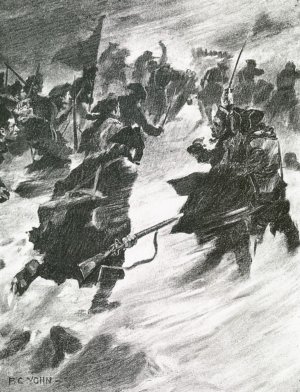 |
|
American Assault on Queec, Midnight December 31, 1775 |
Again and again they attacked as musket shot and grape from the barking cannon covered the top of the log barrier. As bodies piled up it became obvious that none of Benedict Arnold and General Richard Montgomery's forces were going to get over the 20-foot summit in the face of the murderous density of shot raking the rebel forces. When the smoke cleared it disclosed that Arnold had been badly wounded and among the bodies lying in the snow was that of Montgomery. Thanks in large measure to Sir Guy Carleton the British forces prevailed against the American assault and the defeated Americans eventually retreated from Canada
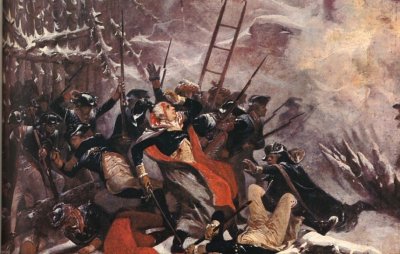 |
|
Death of General Richard Montgomery (1738-75) |
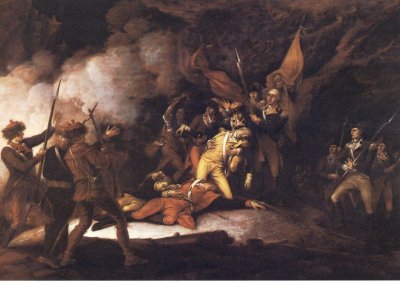 |
|
Death of Montgomery by John Trumbull |
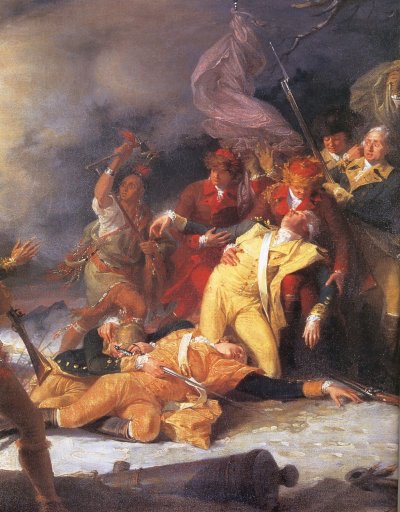 |
|
Another Version of Death of Montgomery |
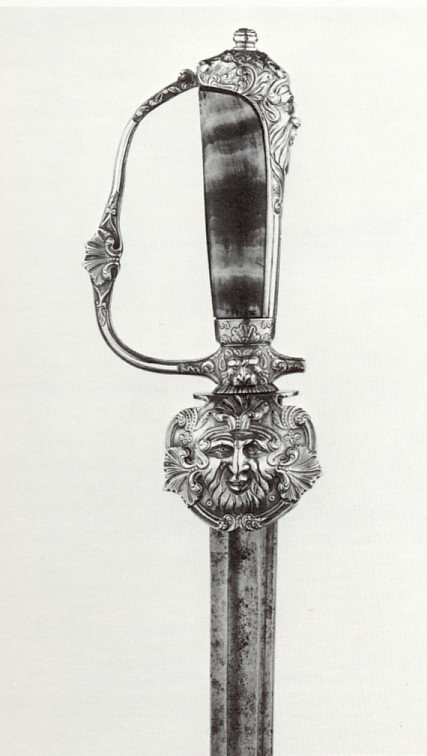 |
|
Montgomery's Sword Given By General Guy Carleton to Montgomery's Widow |
When Guy Carleton took up his post as lieutenant governor of Quebec in 1766 he brought with him a full-sized standing marble statue of George III, a gift of the king to the city of Montreal. It was placed in the Place d'Armes. On May 1, 1775 a group of French Canadians who were sympathetic to the cause of the American colonies and very frustated when Canadians failed to fall in beside the Americans, painted the statue black, hung a string of potatoes around its neck and attached a sign to it that said, "This is the Pope of Canada." In 1776 as Benedict Arnold's unsuccessful invading army was retreating from Montreal someone smashed the statue and dumped the pieces of it down a well. Stories about the statue survived and in 1828 the head alone (below) was recovered from the well.
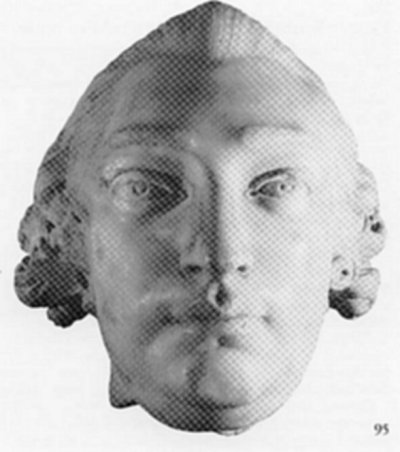 |
|
Head of George III |
When the Americans failed to win Canada with words and war Benjamin Franklin sought to take Canada with diplomacy and duplicity. The British Prime Minister Lord Rockingham had two rival ministers in his cabinet, Foreign Secretary Charles Fox and the Colonial Secretary Lord Shelburne. Each of these men had his own negotiator in Paris. Franklin cannily manoeuvred to ensure that Shelburne's envoy, whom he found it easier to influence, received the commission to negotiate with the Americans. When Rockingham was dismissed Shelburne became prime minister and Fox resigned from the cabinet.
On October 30 the American and their British counterparts began an intense week of negotiations which started at 11 a.m. and ended through late suppers most evenings. The British types across the table were no match for the clever American negotiators. Richard Oswald, the chief British negotiator, a retired, one-eyed merchant and former slave trader who made a fortune in government contracts, favoured the American point of view and said he agreed with Franklin that Britain should cede Canada to America. He was contemptuously referred to in England as an additional American negotiator. As far as Oswald was concerned Canada's frontiers were only lines on a map and more or less land on one side or the other of the new boundary meant nothing to him. To the Americans the lines represented land and they pressed relentlessly for evermore of the fertile frontier which was to become the critical factor of their nation's history.
Before the peace process even began Britain's chief negotiator, Richard Oswald, openly admitted to Franklin that Britain was war-weary and anxious for peace. He hinted that if absolutely necessary Canada and the case for the Loyalists could likely be sacrificed in the interests of the empire at large. He tacitly accepted Franklin's paper proposing the surrender of Canada as a basis for peace and passed it on to the then unpopular prime minister, Lord Shelburne. Shelburne shared it with the king but carefully concealed it from his cabinet.
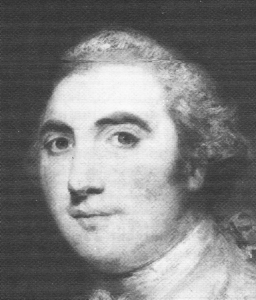 |
|
Earl of Shelborne |
The "old conjurer" Franklin with the cleverness of a kind in which he excelled played the diplomatic game brilliantly. In correspondence with the devious Shelburne at whose home in Berkley Square old Ben was a frequent guest, Franklin advanced his "Canada proposal." In Franklin's home on Craven Street in London he frequently hosted for the fifteen years he lived there such luminaries as Shelburne, William Pitt, Adam Smith and Thomas Paine. In fact, during this period the rented five-storey Georgian townhouse became the first American embassy.
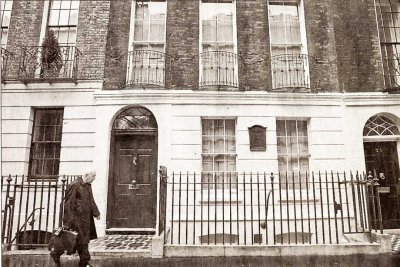 |
|
Franklin's London Home at 36 Craven Street as it is today. |
In a typically wily way Franklin tried to convince Shelburne that Canada was not really worth much to Britain, its sole value being "trade for peltry," a few skins for which Britain was paying plenty. Britain conducted more trade with the tiny island of Jamaica than with all of Canada. Franklin acknowledged that Britain had every right to retain Canada and Nova Scotia but he forcefully argued that if Britain really wanted a future free of discord with a friendly American ally, Britain should do the right thing and throw in these colonies. [****] Think of the impact, Ben purred, that this would have on the minds of Americans. It was, said Franklin, the only way Britain could ever hope to recover the respect and affection of the American people and endear herself forever to the residents of the new republic. Fortunately, complications arose which frustrated Franklin's hopes of handing Canada to Congress.
"We look only to heaven and to France for succour," said John Adams. Without French help the United States could not have won the war. It was, however, not solely to assist the United States that the French became involved. France entered the war on America's side but as time passed it began to appear that she did so more to distress England and achieve her own ends than to serve the cause of the 13 Colonies. To France, America's liberty was incidental. France was intent on an independent but vulnerable United States that would be forced to lean heavily on French support. France eagerly anticipated her re-entry into North America which is was something the Americans did not want. When it dawned on American negotiators that the French were more interested in dividing up the spoils of North America than in assisting them to gain their independence, the Yankees promptly ignored the directions received from Congress.
Their suspicions were clearly evident when one American negotiator asked the other "Are you afraid of being made the tools of the Powers of Europe?". "Indeed I am." answered the other. "Which powers?" "All of them."
It came as no secret to the "persevering, rapacious, ambitious" Americans that France had not shed blood and spent treasure solely to nurture a new nation in North America where the French still had powerful ambitions. The Americans were quick to sense the realities of the situation and outsmarted the French diplomats by abruptly concluding an agreement with England. They had signed without first informing France as agreed and directed by Congress. Comte de Charles Vergennes, the French foreign minister, felt betrayed as did the King of France who had bankrupted his country to finance Aerican resistance. Of France's expensive assistance Louis XVI was to say later - he was 23 at the time Vergennes signed the deal to assist the 13 Colonies - his officials had taken advantage of his youth. He later justified his actions to the King of Spain that he undertook the task "not for conquest or glory but to restore the honour of my oft-insulted banner and to assist an oppressed people who have come and thrown themselves in my arms."
By 1787 France could not meet the interest payments on her debts from the American contest which claimed half her annual budget. Louis XVI said he never thought about the American Revolution without regret. However, he had little time to grieve for less than 10 years after the peace was signed, he lost his head on the guillotine located at place Louis XV. Later that spot became known as place de la Revolution and today it is place de la Concorde.
Franklin was felled by "cruel gout" and kidney stones which incapacitated him during a critical part of the negotiations. Weak and paralyzed on his left side from urological ills, Franklin put in irregular appearances. As a result leadership had fallen largely upon John Jay who almost single-handedly resolved negotiations with the British. Negotiations were exhausting for Jay and Oswald who regularly drafted throughout the night in preparation for the next day's discussions.
Franklin's expectations of a country that included Canada were sacrificed to expediency. In his haste to terminate treaty negotiations, Jay ignored Franklin's proposal for the cession of Canada and Nova Scotia. Franklin had consigned them to the category of 'advisable' and the urgency of the moment required that Jay act quickly to achieve the 'essentials.' Jay declared magnanimously that he would not hold up peace by haggling over what he termed "a few acres."
In the spirit of "sweet conciliation"Britain relinquished far more land than they needed to. British negotiators seemed more interested in appeasing their late enemy than in defending the claim that made most historical and legal sense: establishing a border between the Appalachian Mountains and the Ohio and Mississippi valley into which the Americans had not yet penetrated.
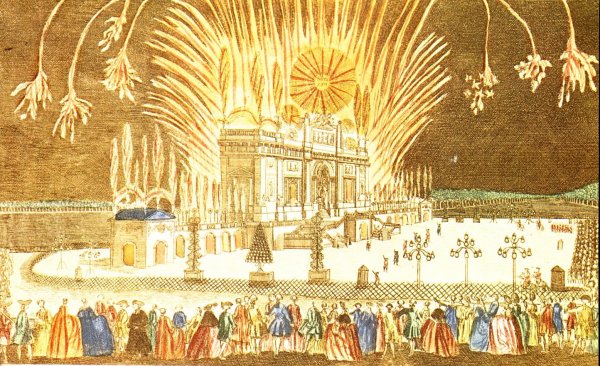 |
|
Fireworks in London to Celebrate the Peace of Paris, 1763 [29] |
In the words of Francis Parkman, "a half a continent changed hands at the scratch of a pen." By the Peace of Paris that ended the Seven Years' War in 1763, Britain had acquired the vast area controlled by France - the old Canadian southwest. The surrender of Canada gave Britain title to all the French posts in the interior westward to the Mississippi River including Fort Frontenac, Fort Niagara, Detroit, Michilimackinac and Sault Ste. Marie and the vast domain that spread westward to the mountains.
This great area became forbidden territory as far as Americans were concerned because when Britain approved the Proclamation of 1763 its intention was to prevent the American colonists from claiming lands beyond the sources of rivers flowing into the Atlantic. This excluded settlement on lands in the valley of the Ohio River which flows westward to the Mississippi and into the Gulf of Mexico. Britain intended this land to be 'Indian land.' Any Americans who had already settled there were "to remove themselves from such settlements." By sealing this land from white settlement Britain hoped to appease the Aboriginals who were angry at being excluded from the British peace terms with the Americans. Britain hoped this would provide time for them to pacify the Natives and eventually permit them to make treaties with the Natives to acquire some of this land.
Restriction on the westward movement angered and embittered the Americans. The colony of Virginia had already promised to its militiamen hundreds of acres bordering the Ohio River as a reward for services rendered. The Proclamation of 1763 and its strictures dictated from London closed land to all adventurous, ambitious frontiersmen and shut them out from what they considered their natural right to expand westward. Nothing more was done with the land until 1774 when Sir Guy Carleton convinced the British government to pass the Quebec Act. It represented a bold piece of statemanship and foresight that would keep Canada loyal to England and prevent it from becoming part of the United States. In accordance with this act Canada's historic title was recognized to the vast inland domain which she had discovered, explored and exploited. Th act also gave French people the right to freedom of worship and permitted them to retain their many old customs and institutions. The act angered Americans for the extension of the colony's boundaries to the Ohio River prevented them from settling the northwestern portion of the continent.
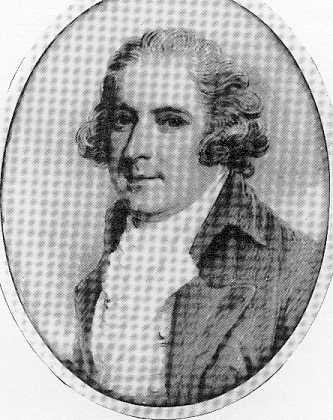 |
|
Sir Guy Carelton at the time the Quebec Act was passed. |
The Quebec Act extended the boundary of Quebec southward to include the western lands lying between the Ohio and the Mississippi Rivers. Britain did this in order to attach the Ohio country to its 'safe' province of Canada and prevent the Americans from flooding into this valuable land. [The shaded sections on the two maps below indicate the boundaries of Quebec which existed in 1763 [top] were considerably enlarged by the Quebec Act of 1774.] [bottom]
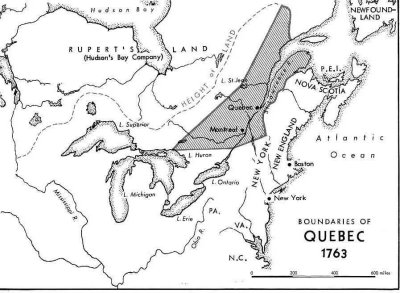 |
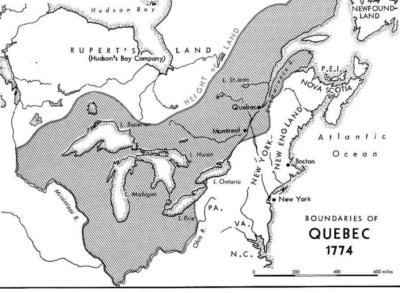 |
Britain included the Ohio Valley within the new boundaries of Quebec to block westward expansion by the American colonies and effectively box them in and destroy their cherished dream of expanding into the western lands they considered theirs. As early as October 10th, 1780 the first Continental Congress passed a resolution pertaining to the American West. It stated that the western territory, which might one day " be ceded to the United States by any particular State, shall be disposed of for the common benefit of the United States and shall be settled and formed into districts which shall become members of the Federal union."
The "particular state" they had in mind turned out to be Great Britain. The British negotiators at the peace parley did not disappoint them. For the boundary the Americans had two proposals to make. Both were alike in the eastern region. Both began with the St. Croix River, ascended it to its source, struck due north to the height of land between the St. Lawarence system and the rivers draining into the Atlantic Ocean, followed the height of land and the Connecticut River until the forty-fifth parallel of latitude was reached and then continued along the forty-fifth parallel to its intersection with the St. Lawrence River. From this point westward the two proposed lines followed radically different courses. One continued straight west along the forty-fith parallel to the Mississippi River. The other followed the line of the Great Lakes and their connecting rivers to the north-west angle of the Lake of the Woods from which pointit ran due west to the Mississippi.
In the end the British agreed to accept the seond alternative. They generously accommodated the Americans by agreeing to a boundary line drawn through the Great Lakes thereby relinquishing all the lands south of them. A line which was completely artificial and arbitrary had been drawn through th commercial empire of the St. Lawrence and at one stroke Canada lost the entire south-western half of its vast inland domain which she had discovered, explored and exploited. With no concern for the great issues involved, Canada had been despoiled of half its inheritance. In no time at all and with very little discussion Oswald casually conceded a frontier that assigned Lake Michigan to the Americans and divided the other lakes between the two countries. American negotiators were astounded that with a wave of the hand Britain had relinquished the priceless country that today constitutes the half dozen states lying between the Great Lakes and the Ohio River. British negotiators more than satisfied American terms for the territory. In return they never even received an acknowledgement of gratitude.
The greatest bones of contention were the fishing rights off Newfoundland and the Loyalists. As Adams remembered, the days passed in “a constant scuffle, morning, noon and night about cod and haddock on the Grand Bank, deerskins on the Ohio and pine trees at Penobscot. On no point was American resolve more pronounced than on the issue of the compensation of American Loyalist about which Franklin was particularly severe.
Britain wanted American compensation for the Loyalists whose allegiance to the king had cost them dearly - their property, their estates, their country and in some cases their very lives. Although the British commissioners pressed for the payment of compensation to the Loyalists by the Americans, Franklin offered no hope of settlement of this issue. He attempted to evade the issue by declaring that they lacked final authority despite having been given complete freedom by Congress to negotiate anything, Franklin insisted that "neither Congress nor its committee had any power on this point." American negotiators "sheltered themselves under want of powers and contented themselves with making sham recommendations." All Congress could do was to suggest to the States that they recompense the dispossessed Loyalists. Even as he spoke these words Franklin knew it would never happen.
British negotiators pressed for something more substantial because Prime Minister Shelburne knew he could never face Parliament without having some provision in the treaty compensating the Loyalists. Somehow Britain had to shift the cost for the displaced colonists to the Americans who were after all responsible for the unfortunate exiles, otherwise the Loyalists would continue to be a drain on British taxpayers.
This issue was made impossible to solve by Benjamin Franklin, who contrary to his usual kind, considerate, compromising disposition, resisted firmly finding a favourable settlement for the Loyalists. If the British insisted on reparations, would they then care to discuss the American towns that had been burned, the plantations devastated? Even his own Philadelphia library had been plundered. It is thought that Franklin's Loyalist son, William, accounted for his father’s intransigence. William's activities as a self-appointed Loyalist leader made the Paris papers throughout the fall. Franklin hated his son for favouring the King over Congress and sought to display his hatred for William publicly. This Franklin family feud added a personal
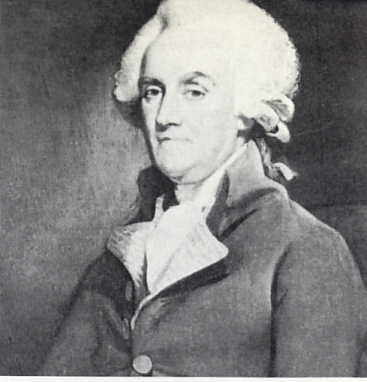 |
|
William Frankli, Ben Franklin's Son |
poignancy to the final weeks of negotiations. Both Adams and Jay were amenable to compromise on the Loyalist issue but not Benjamin Franklin. He was determined to wreak vengeance on the Loyalists largely because of his son's support of the sovereign's cause.
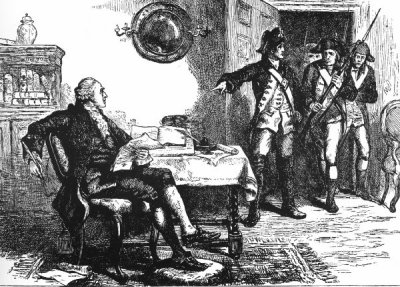 |
|
The Arrest of Ben Franklin's Son, William, by order of Congress {United Empire Loyalists - Mika} |
William Franklin was arrested and held for a lengthy period before being released from captivity in Connecticutt. He went to New York where he served as president of the Board of Associated Loyalists and later fled to England bearing the label of America's second most hated traitor after Benedict Arnold.
To ensure that Loyalists received no compensation for losses suffered at the hands of the Americans, Ben Franklin went so far as to publish a fictitious account of the horrors suffered by American Patriots at the hands of the British Tories. His goal was to try to show that sympathy was due the Rebels, not the Loyalists for losses suffered. Franklin even circulated a false story about a shipment of American scalps sent to Britain by the Seneca Indians. He hoped the atrocity stories would prejudice the Europeans against Britain and the Loyalists. Franklin refused to go beyond the meaningless statement in the treaty that Congress should "earnestly recommend" to the several states to restore Tory property and that no further confiscations should occur.
A treaty settlement seemed remote until Franklin's fruitful mind hit upon a quid pro quo. He said he would agree to allow compensation for the losses of the Loyalists, if the British government agreed to compensate Americans for the slaves who had joined the British to fight for their liberty. Ironically, Franklin and other American leaders saw no sad and tragic irony in the fact that having just fought a war for their own independence, they were now demanding compensation for or the return of slaves who had simply done the same thing and fought to win their freedom. The Americans also demanded compensation for the damage done by Loyalists to American property.
Fearful that such negotiations would lead to disputes that could drag on for years, British delegates assented to a peace treaty that left out the Loyalists. The treaty did include the worthless promise that the United States Congress would recommend to the 13 States that they cease persecuting and commence compensating the pitiful Loyalist exiles. Since Congress had no jurisdiction over the individual states the promise was a hollow one. Not a pennyworth's of property was ever restored to the Loyalists. Britain agreed to withdraw its forces and return all "state records, archives, deeds and papers" which had fallen into its hands. Thus by a process of tact, temporizing and exhaustion the American negotiators achieved their ends.
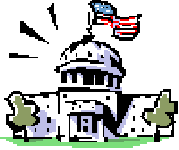 |
Mid-April brought word to America that the preliminary peace had been signed in Paris and that all hostilities were to cease. Eight years had elapsed since Lexington and Concord and the news was met with rapture. Congress, however, found itself torn between backslapping and hand-wringing. They were shccked to learn France had not been consulted before the signing. Their delegates were not to have proceeded without France but inexplicably they had done so. Members of Congress could not account for this rogue behaviour and were torn between happiness and horror at their departure from "the candor, rectitude and plain dealing professed by Congress." Should they be censured or notified of their country's disappointment and left to "get over their embarrassment as best they could?"
When the French learned that a treaty had been concluded without any French consultation Vergennes fired off this letter to Franklin.
In His Own Words
"I am at a loss sir to explain your conduct and that of your colleagues on this occasion. You have concluded your preliminary articles without any communication between us although the instructions from Congress prescribe that nothing shall be done without the participation of our King." Franklin conceded they should have been consulted before signing and asked to be excused. The worldly Vergennes was more surprised at the generosity of the British concession than the duplicity of the Americans.
Initially when the peace treaty was presented to the House of Commons by Shelburne it was rejected as being too humiliating to Britain which was not yet ready to admit just how calamitous the country's defeat had been. Later when William Pitt became prime minister Parliament had second thoughts and agreed to accept the peace settlement largely as it had been negotiated under Shelburne. The king, who vowed he would die rather than concede independence to his fractious colonies, consented to peace with the victorious colonials. At the opening of Parliament on December 5th, 1783 a few days after the terms of the treaty had been settled upon a humiliated George III announced that he had agreed to declare the American colonies free and independent. Afterwards he asked the prime minister, "Did I lower my voice when I came to that part of my speech?"
The king made the following statement in which he declared good riddance and blatantly denied any responsibility for the loss of an empire. "I cannot conclude without mentioning how sensibly I feel the dismemberment of America from this Empire. I should be miserable indeed if I did not feel that no blame on that account can be laid at my door. I did not also know that knavery seems to be so much the striking feature of its inhabitants of America that it may not be in the end be an evil that they became Aliens to this Kingdom."
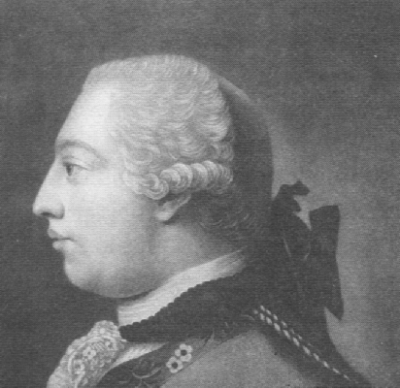 |
|
George III |
Much has been written about the king who cost his country its American colonies. A good deal of the Declaration of Independence is devoted to condemning him. The fierce denunciation of George III in twenty-eight of its thirty-two paragraphs "submitted to a candid world," list the king's "repeated injuries and usurpations." After documenting all his despotic abuses, Jefferson, who wrote much of the declaration,[*****] ended by stating, "A prince whose character is thus marked by every act which may define a tyrant is unfit to be a ruler of a free people."
Those who drafted the declaration understood that hatred is more easily caused if it can be made to apply to an individual rather than a government. Although some of the charges against George are questionable, they made very effective propaganda. The drafters wisely withdrew the accusation that George had vetoed their attempts to abolish slavery, "this execrable commerce.""Farmer George" was a petulant, misguided monarch determined to restore power to the Crown by making his ministers "servants of the King," in fact as well as in name. He sulked when things did not go his way, rejected advice that differed from his own views and denounced any opposition as disloyalty. He was determined his will would prevail: the Americans would be forced to submit. Throughout his reign he showed himself to be a dogmatic, obstinate individual who often confused his own personal feelings with the public welfare. His mother, who educated him, regularly urged him to "Be a king, George, be a king." George was determined to follow her advice. When his obstinacy encountered an immovable obstacle "black humour claimed him."
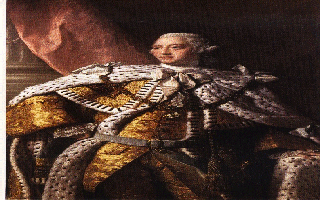 |
|
George III In Coronation Robes |
Americans owed their successful revolution largely to the incompetence of the British generals and the ineptitude of the British negotiators. The latter blithely gave away vast areas of North America casually conceding to the Americans the interior of a continent and permitting the Americans to win the greatest victory in the annals of American diplomacy. The detailed agreement secretly arrived at was based on maps cleverly drawn up by the Americans to include all of the country between the Allegheny Mountains and the Mississippi River. This land became the states of Ohio, Indiana, Illinois, Iowa, Wisconsin, Missouri, Michigan, Minnesota.
"One knows not at which most to marvel - the boldness, skill and success of the Americans or the cowardice, ignorance and recklessness of the British negotiators." Canada had a very legitimate claim to lands known as the "Old North West," which lay south of the Great Lakes but no one spoke for Canada. There is no heavier charge among all the heavy charges that could be brought against the British government in relation to the colonies than that which arises from the ignorance and neglect shown. The British did everything wrong. Their blockade failed; their choice of generals was abysmal; they were inept negotiators; and they failed miserably to exploit to the full their natural allies: the one-third or so American Loyalists who were willing to risk everything to oppose independence and remain a proud part of the British Empire.
On November 30, 1782 the American negotiators with their secretary, Temple Franklin, William's Franklin's son who had been raised by this granfather Benjamin, met in Oswald's suite at the Grand Hotel Muscovite to sign the Peace of Paris. When the French finally learned of the treaty's provisions, they jeered that Britain had not make peace she had bought it. When the American Congress read the terms of the treaty signed "in the name of the Most Holy and undivided Trinity" on September 3rd, 1783 they were astounded for it contained concessions far beyond anything they had ever dreamed of obtaining.
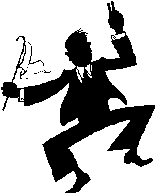 |
The passage of years has confirmed the wisdom of using natural practical boundaries to separate the United States of America from the "few acres" that became Canada.
[*]A rare, 184-year-old copy of the U.S. Declaration of Independence found by a bargain hunter at a Nashville thrift shop is being valued by experts at about 100,000 times the $2.48 US purchase price. Michael Sparks, a music equipment technician, is selling the document art an auction on March 22 at Raynors' Historical Collectible Auctions in Burlington, N.C. The opening bid is $125,000 US and appraisers have estimated it could sell for nearly twice that. Sparks found his bargain in March 2006 while browsing at Music City Thrift Shop in Nashville. When he asked the price on a yellowed, shellacked, rolled-up document, the clerk marked it at $2.48. It turned out to be an "official copy"> of the Declaration of Independence, one of 200 commissioned by John Quincy Adams in 1820. Sparks didn't know he had such a valuable piece until he did some online research and then had appraisers at Raynors' offer an opinion.[Associated Press, Feb. 23, 2007] [**] One hundred and fifty years later in 1927, the silk, five-foot-by-four-foot flag with seven red and six white stripes on the top corner of a green field was returned to Delaware. [***] A song composed on the occasion of Burgoyne's defeat. [****] "Jefferson borrowed freely from the phraseology of others in a manner that today might subject him to questions of plagiarism." [Benjamin Franklin, An American Life, by Walter Isaacson] [*****] "People will always try to take from you in negotiations what they could not get from you in battle or direct confrontation.They will even use appeals to fairness and morality as a cover to advance their position. Do not be taken in; negotiation is about manoeuvring for power or placement and one must always put oneself in the strong position that makes it impossible for the other side to nibble away at you during your talks. Create relentless pressure and compel the other side to settle on your terms." The Thirty-eight Strategies of War by Robert Greene.Copyright © 2013 Website Administrator